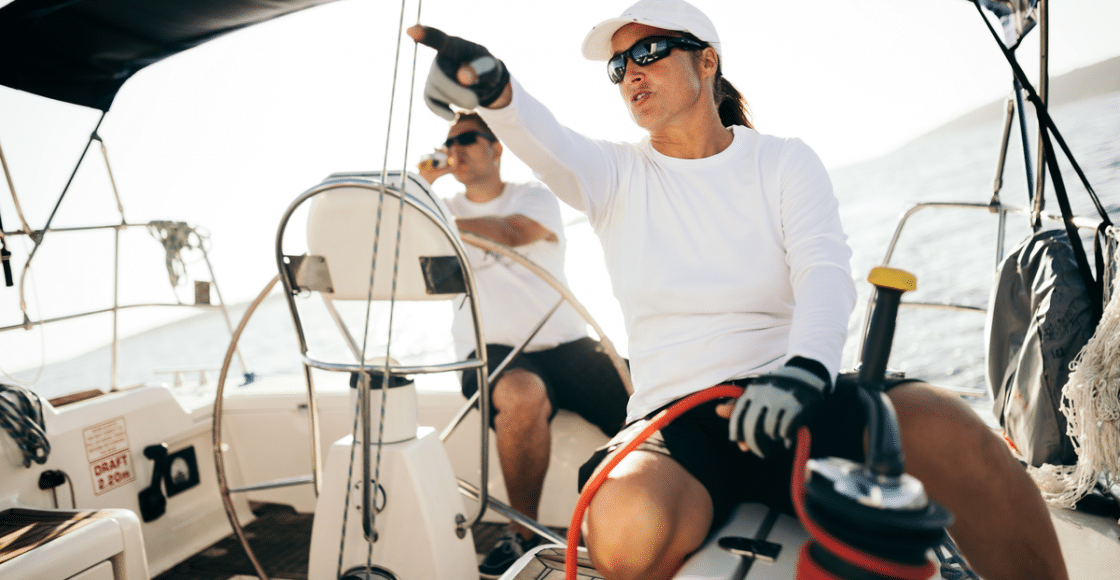

How becoming a charter boat captain is easier than ever
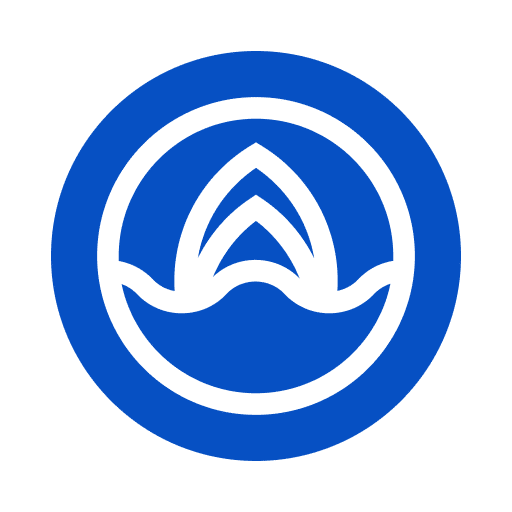
Are you an experienced boater who enjoys taking friends and family out on the lake, river, or bay? Did you grow up on the water? Do you see nautical charts in your sleep and make float plans for the fun of it? If so, becoming a yacht charter captain may be just the profession for you.
Charter Boat Captains
Charter boat experiences such as fishing, sightseeing, and water sports are always popular options in resort and vacation destinations . With today’s boat sharing economy which has allowed boaters to rent a boat from a private owner, the title of boat captain has become an even more viable career option. Often, the renter may not be an experienced boater and needs to hire a licensed and knowledgeable captain .
This is where your skills come into play. Though it depends upon experience level, demand, and geographic area, a charter boat captain can make a great income doing what he or she loves – being out on the water.
A charter boat captain’s license is issued by the United States Coast Guard and is based upon the following criteria:
- Total days of service
- Waters served upon
- Weight of the vessel
There are four main categories of charter boat captain license:
- Operator of Uninspected Passenger Vehicles License (OUPV) – One of the most popular types of boat captain license, this is also called a 6-Pack License. The vessel is less than 65 feet and there are no more than six passengers. This license usually applies to fishing, diving and sightseeing boats. To obtain this license, the boater must have 360 days of experience on inland or coastal waterways.
- OUPV Limited Credential – Also called a “launchtender’s license,” this license has a very specific purpose. It is used for the operation of uninspected vessels for a short time. This could include transporting boaters to and from a dock to a bigger boat that is moored out in the water. The captain must have 90 days of service on that type of vessel and complete a United States Coast Guard (USCG)-approved Safe Boating Course.
- Limited Master Credential – In addition to the OUPV requirements, this option is licensed for boats that have passed US Coast Guard inspection and have an inspection sticker. This license requires 120 days of service on the type of vessel that will be operated as well as a completed USCG-approved Safe Boating Course. The license can be extended to include sailing vessels if the captain completes 120 days of service on a sail-powered vessel.
- Master, 100 Tons Credential – Vessels up to 100 tons can be operated with this license, and there can be as many passengers on board as the vessel will hold. The captain must have at least 360 days of service on any vessel. A separate exam can be taken to qualify for a tow boat assistance license.
Job opportunities for charter boat captains include:
- Join a boat sharing company, such as Boatsetter , and captain fishing charters and sightseeing tours
- Embark on snorkeling and diving trips and sunset and dinner cruises
- Assist in towing with companies such as Sea Tow or Tow Boat U.S.
- Operate water ferry service for transportation, recreation and entertainment
Hey Captains, what tips would you give to someone considering a new career? Share some insider tips…
Ready to join the Boatsetter captain network? Sign up today and start earning on your schedule!

Boatsetter empowers people to explore with confidence by showing them a world of possibility on the water. Rent a boat, list your boat, or become a Boatsetter captain today.
Browse by experience

Explore articles

How Sails Work: Understanding the Basics
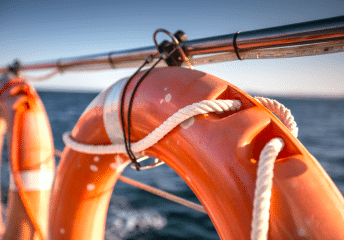
How to Prepare Your Boat for Its First Boatsetter Rental
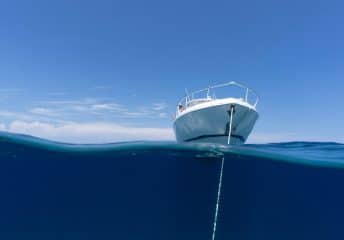
How to Double-Anchor a Boat
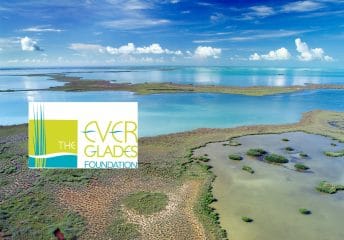
The Everglades Foundation: Science First | #MindYourWake Series

- License & Permits
- Commercial Licensing Information
- Commercial Saltwater Licenses
What the FWC Saltwater Charter License authorizes:
A Charter Captain or Boat License is required to carry paying customers (where a fee is paid directly or indirectly) for the purpose of taking, attempting to take, or possessing saltwater fish or organisms.
To be a saltwater fishing guide in Florida, you must comply with U.S. Coast Guard (USGC) requirements. The U.S. Coast Guard (USGC) requires all operators of for-hire vessels to have a Captain license/Merchant Mariner Credential.
Charter, headboat and saltwater fishing guide operations must have an FWC charter captain or boat license to cover their passengers, who are not required to hold a recreational saltwater fishing license. Customers authorized to fish under the vessel license are not required to hold a recreational saltwater fishing license.
Dive charters: Scuba divers engaged in fishing or lobstering must have an individual saltwater fishing license and all necessary permits if the vessel they are on does not have the necessary vessel license.
Charter Captain Licenses allow a licensed captain to go from boat to boat to do business. A current Coast Guard License to Operate or Navigate Passenger Carrying Vessel License must be provided in order to purchase these licenses. Any vessel then used by a charter captain to do business must be commercially registered or have a U.S. Coast Guard Certificate of Documentation with a commercial designation.
- Charter Captain - 4 or fewer customers $201.50
- Charter Captain - 10 or fewer customers $401.50
- Charter Captain - 11 or more customers $801.50
- Charter Snook Permit $10.00
- Charter Lobster Permit $5.00
Charter Boat Licenses may only be used on the boat designated on the license and are available for vessels that are commercially registered. A commercial vessel registration or U.S. Coast Guard Certificate of Documentation (with a commercial designation) must be provided in order to purchase these licenses.
- Charter Boat - 4 or fewer customers $201.50
- Charter Boat - 6 or fewer customers $401.50
- Charter Boat - 10 or fewer customers $401.50*
- Charter Boat - 11 or more customers $801.50*
*Issued to Coast Guard inspected vessels only.
How to Apply
In order to purchase an FWC Charter Captain license, you must have a Coast Guard Captain's license. Call 1-888-427-5662 for information on the Coast Guard Captain's license. USCG charter boat captain information is available on the USCG web site. The FWC Charter Captain and Charter Boat licenses and commercial registration can only be purchased at tax collector's office throughout Florida. For information about vessel registration visit the Florida Department of Highway Safety and Motor Vehicles, Bureau of Titles and Registrations .
What the FWC saltwater charter license authorizes:
- The vessel license holder to carry up to the number of fishing passengers specified on the license.
- The number of customers specified on the FWC vessel license to take, attempt to take, or possess a limit of saltwater fish or organisms for non-commercial purposes without purchasing a recreational saltwater fishing license.
- A person who holds the “Charter Captain” License does not need to purchase his own recreational saltwater fishing license to recreationally fish from a vessel. He may use his “Charter Captain” because it’s tied to him, this does not apply to a Charter Boat/Vessel License.
What the FWC saltwater charter license DOES NOT authorize:
- Harvest in commercial quantities or the sale of fish.
- Passengers (whether licensed, not licensed, or exempt from licensure) in excess of the number specified on the FWC vessel license to take, attempt to take, or possess a limit of saltwater fish or organisms (even if licensed by the USCG to carry more paying passengers).
- The captain and crew to take, attempt to take, or possess a limit of fish or organisms under the vessel license.
- Freshwater fishing guides.
More Information for Charter Operators, captains and guides
Surf fishing and freshwater fishing guides and their customers are subject to Florida's recreational fishing license requirements. The FWC does not require additional guide licenses.
A charter vessel captain who possesses a six-pack license under USCG and an FWC charter vessel license for up to 4 people may carry up to two extra passengers ONLY when they are NON-FISHERS.
Additional restrictions on charter boat captain and crew and for-hire guides on a keeping their limit of fish under their own valid recreational saltwater fishing licenses are species specific. Currently, for most species of saltwater fish, with the exception of snook, grouper and red snapper in federal waters, all persons aboard a charter vessel can keep a legal limit of fish if the paying passengers fish under the vessel license and the crew fish under their own valid licenses. For-hire guides may also keep a legal limit of fish while on duty with the exception of red drum, snook, grouper and red snapper in federal waters.
- Red Drum (Redfish): FWC regulations prohibit the operator or crew aboard a vessel for hire from harvesting or possessing a red drum. A vessel for hire means any vessel licensed to carry passengers for hire and has one or more passengers onboard who are paying a fee (directly or indirectly) to take or pursue any marine organism. You can read thee rule in the FAC , Chapter 68B-22.005(3).
- Snook: FWC regulations prohibit the operator or crew aboard a vessel for hire from harvesting or possession snook. A vessel for hire means any vessel licensed to carry passengers for hire and has one or more passengers onboard who are paying a fee (directly or indirectly) to take or pursue any marine organism. You can read the rule in the FAC , Chapter 68B-21.004(1)(c).
- Grouper: Gulf of Mexico Fishery Management Council regulations prohibit the captain and crew of for-hire vessels from retaining a federal recreational bag limit of any grouper while under charter in the Gulf of Mexico. Please review the NOAA regulations . The FWC established a zero bag limit for Gulf gag, red and black grouper for captains and crew on for-hire vessels in or on state waters. Current information about grouper rules is available from the FWC Division of Marine Fisheries Management. You can read the rule in the FAC , Chapter 68B-14.0036 (2)(d).
- Red Snapper: In 2008 new regulations were implemented for red snapper in federal waters of the Gulf of Mexico that, among other restrictions, prohibits the captain and crew of for-hire vessels from retaining the federal recreational bag limit. More information on federal action is available from the Gulf of Mexico Fishery Management Council . Refer to the FWC saltwater fishing regulations for more information. The FWC also established a zero bag limit for captain and crew of for hire vessels in Gulf state waters for red snapper. You can read the rule in the FAC , Chapter 68B-14.0036(1)(c).
An occupational license may be required by the city or county where you are doing business. Check with the city and county to see if you need an occupational license.
If you are operating a for-hire vessel in a park or a refuge (e.g., Everglades National Park), you may be required to have additional permits. Please check with the park or refuge headquarters for any specific permitting requirements for those areas.
If you are operating a for-hire vessel in federal waters (outside of 9 nautical miles on the Gulf and 3 nautical miles on the Atlantic), you may need a federal charter vessel/headboat permit before fishing for certain species. Contact the National Marine Fisheries Management Service , Licensing and Permitting Office at 727-824-5326 for information on federal charter vessel/headboat permits.
- Get Started
- OUPV/Six-Pack Captain’s License
- 25/50 or 100-Ton Master Captain’s License
- License Endorsements
- All USCG Captain's License Courses
- FCC MROP – Marine Radio Operator Permit
- FCC Exam Package Deals
- FCC Individual Exams
- FCC Practice Test Books
- Captain's License Guides
- FCC License Guides
- Why Our Students Succeed
- MLS Learning Tools
- Online Testing
- American Hero Fund (ID.me)
- Licensing Guides
- How To Videos
- Help Center
- 24/7 Live Technical Support
- Mariners Life
- Mariners Gear
Add description, images, menus and links to your mega menu
A column with no settings can be used as a spacer
Link to your collections, sales and even external links
Add up to five columns
One Minute Guide: How to Get Your OUPV/Six-Pack Captain’s License
February 11, 2024
If you are looking to offer fishing and sailing charters, become a certified instructor, or provide guide services commercially, then the Operator of Uninspected Passenger (OUPV) Captain's License is for you! Also known as the Six-pack, this is the most popular type of captain’s license.

1 WHAT IS A SIX-PACK CAPTAIN'S LICENSE?
The Six-pack captain’s license , also known as the OUPV license, is a designation awarded by the United States Coast Guard that allows the holder to take up to six paying passengers and crew out on the water. The OUPV/Six-pack license is issued in three forms:
- Inland, Great Lakes & Inland, and Near Coastal. The Inland Captain’s License allows the holder to operate “commercially” on bays, sounds, rivers, and lakes.
- The Great Lakes & Inland License allows you to operate on both the Great Lakes and inland waterways.
- The Near Coastal Captain’s License permits you to operate on both Inland waterways as well as Near Coastal waters (out to 100 miles offshore).
2 WHAT IS AN OUPV LICENSE?
The Operator of Uninspected Passenger Vessels (OUPV) license is another name for the USCG Six-pack captain’s license, which allows the holder to operate a commercial vessel with up to six paying passengers.
3 WHAT SIZE BOAT REQUIRES A CAPTAIN'S LICENSE?
The necessity of a captain's license to legally operate your boat is unrelated to the size of your boat. It depends on whether you are carrying passengers for hire. However, some insurance companies may require a captain's license for yachts over a certain size.
4 WHAT ARE THE SIX-PACK PRIVATE BOAT CAPTAIN’S LICENSE REQUIREMENTS?
- Be at least 18 years old.
- Have a minimum of 360 days boating experience. Ninety of these days must have occurred in the last three years. The Coast Guard calls this recency.
- Be a U.S. citizen or be able to show lawful admittance to the United States for permanent residence if not a citizen.
- Pass a physical exam and a drug test.
- Hold a valid adult CPR and Basic First Aid card.
- Obtain a Transportation Workers Identification Credential (TWIC card), which includes a background check done by Homeland Security.
- Pass a USCG-approved OUPV/Six-pack captain's license course like the one offered by Mariners Learning System.
Although these are the basic minimum requirements, the boating experience for each version of the private boat captain’s license varies slightly.
5 CAN I GET MY SIX-PACK CAPTAIN’S LICENSE ONLINE?
You can use an online course to study for your Six-pack captain’s license, then remote test online. The Mariners Learning System suite of USCG-approved courses offers an alternative to having to take time off, drive to a classroom, and sit in a class with an instructor. These courses are structured for those pursuing a professional career in commercial boating operations and for recreational boaters wishing to increase their knowledge.
Once you complete the course, you will have to sit a proctored exam remotely when it's convenient for you. Any Day. Any Time. Any Place.
6 HOW HARD IS THE OUPV TEST?
The test for the OUPV/Six-pack captain’s license is challenging and requires you to possess a lot of knowledge about being a boat captain, but it is less difficult if you prepare. Some captains report that the questions related to plotting are especially hard and recommend studying those thoroughly. If you take the Mariners Learning System course, you will have a good sense of what the questions on the exam will be and should be well-prepared.
NEXT STEPS FOR GETTING YOUR OPERATOR OF UNINSPECTED PASSENGER LICENSE
If becoming a USCG licensed boat captain sounds right for you, here's what you can do next:
- Check out this infographic: How to Get Your OUPV License .
- Watch this video: So You Want Your OUPV/Six-pack Captain's License?
- Purchase the OUPV/Six-pack course.
Ready to Get Started?
Shop Courses or Talk to a Licensing Specialist
Which USCG Captain's License Should You Choose?
OUPV or Master License? Your choice depends on vessel size and passenger count. Learn the requirements and how to upgrade later.
The first step you need to take to get your captain’s license is to decide which type of license you’re going to pursue.
There are two main types of Coast Guard licenses:
License Type #1 - 25 ton, 50 ton, or 100 ton Master License
License Type #2 - Operator of Uninspected Passenger Vessels (OUPV or Six Pack)
The type of license you choose depends on the size and type of vessel and the number of passengers aboard. You can always upgrade your captain’s license and add endorsements along the way.

OUPV/Six-Pack
The OUPV/Six-Pack license is the USCG license that many recreational boaters choose. It’s called the six-pack license because it allows you to take up to six paying passengers and crew members. This allows you to do small fishing trips, sightseeing tours, dive boats, or sail boats.
The OUPV license is also limited to vessels that are 100 gross tons (about 80 feet long).
Many boaters will get their OUPV license even if they have no intention of doing commercial boating. You don’t need to be licensed by the Coast Guard to use your personal boat, unless you’re taking paying customers out on the water.
Getting your license is still valuable because you’ll brush up on your navigation and safety skills. Plus, having your license gives you the option to captain in a commercial setting.
The OUPV qualifies you to captain uninspected vessels. USCG uninspected vessels can carry up to six passengers and aren’t required to be inspected by the Coast Guard. The uninspected vessel must comply with minimal federal standards for safety, navigation, and pollution prevention .
Inland, Great Lakes, and Near Coastal OUPV
There are three types of OUPV licenses that dictate the bodies of water you can operate on commercially.
The Inland OUPV license allows you to captain on U.S. Inland waters . This includes bays, rivers, and lakes (excluding the Great Lakes).
The Near Coastal license allows you to operate on Inland waters and Near Coastal, which is typically up to 100 miles offshore.
The third license type is Near Coastal with Great Lakes. This license allows you to operate on Inland, Near Coastal, and the Great Lakes .
OUPV license requirements
To qualify for your OUPV license, you’ll need to have 360 days of documented sea days. At least 90 of those days must be within the past 3 years. To attain the Great Lakes or Near Coastal license, you’ll need 90+ sea days on the respective waters.
The Small Vessel Sea Service Form CG-719S is used to record your sea days—the number of days that you were on the water (for 4+ hours in a day) in any given month and year.
Once you have the required sea time, you’ll need to:
- Be at least 18 years old
- Get your TWIC card
- Be a U.S. citizen (or show permanent residency)
- Have a valid First Aid/CPR Card
- Pass a basic physical exam
- Pass a drug test
- Complete a USCG-approved course
Read more about How to Get Your OUPV License
25/50/100 Master
The Master Captain’s License is required to captain any USCG inspected vessel, or vessels carrying 7 or more paying passengers. Larger tour boats, finishing boats, sailboats, and water taxis with more than 6 paying passengers on board require a Master License.
This license also allows you to captain uninspected vessels with fewer passengers. You don’t need to get a lower level license prior to this, or start at the lowest level. Your first license can be a 100 GT Master.
Similarly to the six-pack license, there are different Master licenses based on the size of the vessel, and the water you’re on.
To start, there are 25, 50, and 100-ton licenses. The 25-ton Master license qualifies you to captain vessels up to 25 tons. The 50-ton lets you captain 50-ton vessels. And the 100-ton lets you captain 100-ton vessels.
The license you qualify for depends on your documented sea days and the tonnage of the vessels you were serving on.
25 Ton Master = You have a minimum of 360 days on vessels less than 17 gross tons (GRT).
50 Ton Master = You have 180 days on vessels 26 GRT or larger, or 360 days on vessels 17 GRT or larger.
100 Ton Master = You have 180 days on vessels 51 GRT or larger, or 360 days on vessels 34 GRT or larger.
The Coast Guard will decide which license you’re qualified for based on your documented sea days on your license application. And if you get more sea time on larger vessels, you can always apply for an upgrade, so it’s best to focus on getting the license for the work you’re currently doing.
It only takes 90 days of additional sea service to remove tonnage limitations. For example, after 90 days of sea service, you can apply to upgrade from 50 Ton Master to 100-Ton Master. Note: The Coast Guard won’t automatically update this for you—you’ll need to apply for it.
Just like the OUPV, there are Great Lakes, Inland, and Near Coastal Master Licenses, and your qualification depends on the location of your sea days.
How big is a 25/50/100 Ton vessel?
A 25 GRT vessel doesn’t mean the vessel weighs 25 tons. There are specific formulas to measure GRT outlined in the Coast Guard’s Tonnage Guide .
To give you a general idea of the different vessel sizes:
- A 25-ton vessel can be 40-60 feet depending on how it's built.
- A 50-ton vessel can be 60-70 feet depending on the type of vessel and material
- A 100-ton vessel can be upwards of 200 feet, depending on its construction and uses
25/50/100 Master general requirements
In addition to the required sea days, there are general requirements for your Master License that are similar to the OUPV requirements. These include age, experience, character, physical health, citizenship, approved training, professional competence, a drug test, and more, including:
- Obtaining your TWIC card
- You must demonstrate an ability to speak and understand English.
- You must have at least 90 days of required service on vessels of appropriate tonnage or horsepower within the past 3 years of your application date.
- You must be at least 19 years old (21+ for ocean-going vessels).
- You must have had a physical done within the past 12 months.
- You must get a background check done.
- You must have a valid CPR and First Aid certificate .
- You must complete the appropriate USCG-approved course.
Master license endorsements
In addition to the USCG Master License, there are additional endorsements that qualify you for activities. These include the Assistance Towing Endorsement and Auxiliary Sailing Endorsement.
To operate an inspected (more than six paying passengers) sailing vessel, you need a U.S. Coast Guard auxiliary sail license endorsement attached to your Master License.
You’ll need at least 180 sea days on a sail or auxiliary sail vessel for a Sailing Endorsement onto a Master Inland/Great Lakes Captain’s License, and 360 sea days on a sail or auxiliary sail vessel to add the endorsement onto a Master Near Coastal License. You also need to pass a USCG-approved auxiliary sail course.
Both the OUPV and Master License can be endorsed for commercial assistance towing of disabled vessels—within the scope of the license.
No documented experience is required for the towing endorsement. You must pass a written examination or complete a Coast Guard-approved course demonstrating your knowledge of towing safety, equipment, and procedures.
The validity of the endorsements are the same as your license or MMC on which they’re included, and will be renewed with your MMC.
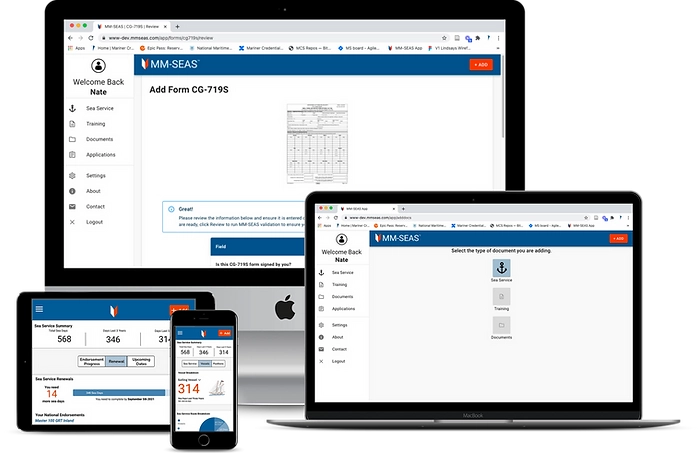
We hope this made your life a little easier and if you have other questions the MM-SEAS team is always here to help!
MM-SEAS is free to use on your own and if you need some more personalized help you can upgrade to MM-SEAS Pro inside of the site.
No matter what, when you are ready to submit your application, you can choose to have the MM-SEAS staff create a perfect application, handle the USCG application fees and work with the USCG on your behalf to resolve any issues for a flat fee of $349 or you can choose to submit on your own.
Pro MM-SEAS members get access to unlimited live 1 on 1 calls with one of our USCG Licensing Specialists. We've found that answering questions live with screen sharing in a video call makes both of our lives easier. Pro MM-SEAS members can access these features inside of MM-SEAS under License Guidance.
Need to renew, upgrade or get your first USCG license? We're here to help.
About the author.

Sam Mckay is a NOAA Corps Veteran working on his PhD in Nuclear Fusion

The Ultimate Guide to Yacht Charter Licensing
- by yachtman
- September 17, 2023 August 26, 2023

Wondering how to get a yacht charter license? Don’t worry! This guide is here to help steer you through the complex journey. It’ll provide insights and guidance at every turn.
We’ll explore the different types of charters and the regulations that come with each. From bareboat charters to crewed charters and flotilla charters, this guide has got you covered.
Let’s take a step back in time. Yacht chartering dates back centuries! In ancient Egypt and Greece, wealthy individuals would rent vessels for leisurely trips. Now, this age-old tradition has evolved into an entire industry.
With this guide, you’ll have no trouble navigating the intricate web of yacht charter licensing. Your unforgettable voyage awaits in these azure expanses!
Understanding Yacht Charter Licensing
To navigate the world of yacht charter licensing efficiently, arm yourself with a clear understanding of the subject. Define yacht charter licensing and grasp its significance with this comprehensive guide. The sub-sections delve into the definition of yacht charter licensing and highlight the importance of obtaining this licensing for your yacht charter business.
Definition of Yacht Charter Licensing
Yacht Charter Licensing is about the legal needs and permissions for running a yacht charter business. It includes licenses for both the yacht and the crew on board. Here is a table with an overview of the different licenses required:
More needs to be considered. Some areas or countries may have extra licensing rules or restrictions for yacht charters. It’s important to check these regulations so that there are no legal problems.
Pro Tip: It’s best to consult with maritime authorities or legal pros familiar with yacht charter licensing in the desired area. This way, all necessary permits can be obtained before starting the venture.
Importance of Yacht Charter Licensing
Yacht charter licensing is essential. It guarantees safety and quality for yacht owners and charterers. By obtaining a license, companies signify their dedication to abiding by industry regulations and safeguarding their vessels. This safeguards the charterer and creates trust in the market. Plus, it ensures that yachts abide by safety protocols and maintenance standards.
Licensing also benefits the environment. Operators must stick to guidelines for waste management, avoiding damage to marine ecosystems. By supporting licensed companies, charterers help promote sustainable practices in the yachting industry.
The Maritime Labour Convention (MLC) of 2006, adopted by the International Labor Organization (ILO), is an illustration of the significance of yacht charter licensing. It sets out minimum requirements for working conditions for seafaring occupations, including those involved in yacht charters. This is necessary for maintaining quality crew and looking after the welfare of workers.
Steps to Obtain Yacht Charter License
To obtain a yacht charter license, you need to follow specific steps. Start by researching and understanding the legal requirements. Gather all the necessary documentation and submit the application along with the required fees. Additionally, attending mandatory training or workshops is crucial. Each of these sub-sections serves as a solution to successfully obtain a yacht charter license.
Research and Understand Legal Requirements
Navigating the complex legal requirements of yacht charters can be daunting. To ensure compliance and avoid legal complications, gaining a comprehensive understanding of relevant laws and regulations is essential. Here are three steps to help you get started:
- Research local laws and regulations. Different countries may have different laws governing yacht charters, so it’s important to know the necessary permits, licenses, and certifications required.
- Get professional guidance. Maritime law can be tricky, so consulting a lawyer or maritime expert specializing in yacht charters is advisable. They can help understand any nuances and get the needed permits and licenses.
- Get acquainted with industry best practices. Keeping up-to-date with industry standards can ensure all legal requirements are met, as well as high levels of safety, professionalism, and customer satisfaction.
It’s also important to stay informed about any changes to legislations, and to get a license if you plan on establishing a successful yacht charter business.
Gather Necessary Documentation
To get a yacht charter license, follow these steps:
- Fill an application form: Get the needed form from the licensing authority and include your info and contact details.
- Submit ID: Attach copies of ID like passport or driver’s license.
- Provide proof of address: Show documents to confirm your residence, like bills or bank statements.
- Offer maritime qualifications: Include certifications that show your nautical knowledge, such as boating license or captain’s credentials.
- Give insurance details: Give evidence of liability insurance for the yacht you’re chartering.
- Submit financial statements: Give financial records to prove you can meet financial obligations for running the charter business.
These steps will help you get a yacht charter license quickly.
Also, each licensing authority may have unique requirements and other documents. So, check the relevant authority for details applicable to you.
Fun fact – 12 million people did yacht chartering around the world in 2019.
Submit Application and Pay Fees
For attaining a yacht charter license, here’s how you go about it:
- Fill out the application form correctly and comprehensively.
- Gather the supporting documents needed, e.g. proof of identity and ownership/lease of the yacht.
- Send the form and the documents to the licensing authority.
- Pay the fees either online or in person at the payment centre.
It is essential to double-check that all the info given is accurate and up-to-date. Errors or missing documents may delay the process.
Also, according to SailChecker, the time it takes to get a yacht charter license can be from a few days to a few weeks.
Attend Mandatory Training or Workshops
Getting a yacht charter license requires attending mandatory training or workshops . These are key for aspiring yacht operators to gain the required knowledge and skills.
At these courses, participants learn about safety regulations, navigation techniques, and emergency handling at sea . Plus, they practice on yacht equipment and get an understanding of operating a yacht.
Attending these mandatory sessions helps future yacht charter operators sharpen their expertise and guarantee their clients’ safety and satisfaction.
Note that these training programs provide one-of-a-kind information, with industry experts sharing their experiences and giving valuable insights .
For a career in yachting, attending these mandatory training sessions is essential. It keeps professionals up-to-date with the latest developments and gives them an advantage over others. Don’t miss this chance to broaden your knowledge and abilities in the exciting world of yacht charters!
Benefits of Obtaining Yacht Charter License
To gain the benefits of obtaining a yacht charter license, unlock exclusive opportunities, enhance credibility, and ensure compliance with regulatory standards. Access to exclusive yacht charter opportunities opens doors to luxury destinations. Enhanced credibility and trustworthiness build a reputable business. Compliance with regulatory standards ensures adherence to legal requirements for smooth operations.
Access to Exclusive Yacht Charter Opportunities
Gaining a yacht charter license offers access to exclusive sailing experiences. It opens a world of luxurious and private sailing that’s not available to the public. Let’s check out the benefits!
Top-tier yacht charters from companies like The Moorings, Sunseeker Yachts and Burgess Yachts can be accessed by license holders. These provide a wide selection of quality vessels for a comfy sailing experience.
Plus, there are hidden gems to explore. Secluded islands, untouched coastal regions – these are inaccessible to traditional tourists. A yacht charter license provides exclusive access so you can create a custom travel itinerary suited to your preferences.
Pro Tip: Keep up with industry news and trends to make the most of the license. This includes new charter companies, destinations, and discounts/promos only for license holders.
With a yacht charter license, you get exclusive opportunities for unforgettable sailing adventures. From luxury charters to hidden paradises, the possibilities are endless! Stay informed and enjoy unique experiences on the open seas.
Enhanced Credibility and Trustworthiness
A yacht charter license brings enhanced trust and credibility. This shows professionalism and provides assurance that the operator obeys industry standards.
The advantages of a license include:
- Following safety protocols
- Regular inspections by maritime authorities
- Being part of organizations such as the IYBA or CYBA
- Having a successful track record
Positive feedback from clients is evidence of reliability and trust. You can find this info on review sites or the operator’s website.
To summarize, a license boosts trust and credibility in various ways. It ensures safety and inspections, plus adds credibility through connections with professional associations. This builds confidence for those seeking a reliable yacht charter.
Compliance with Regulatory Standards
Adhering to regulatory standards is vital for obtaining a yacht charter license. This ensures operators stick to legal demands and uphold top safety and operational standards.
The table below shows how important compliance with these standards is:
These regulations guarantee passenger safety, protect the environment, and reduce potential risks. Also, adhering to them promotes industry professionalism.
Apart from fulfilling legal obligations, getting a yacht charter license has many advantages. For example, it boosts the operator’s reputation and encourages confidence in potential customers. This can lead to more business opportunities and returning customers.
XYZ Charters , a renowned firm in the business, is a good example of the rewards of regulatory compliance. They always follow all regulations. As a result, they have earned a dependable client base and are often encouraged by pleased customers. By emphasizing compliance, XYZ Charters has secured its place as a reliable yacht charter services provider.
Challenges and Considerations
To navigate the challenges and considerations of yacht charter licensing, equip yourself with the necessary knowledge. Understand the cost of license acquisition, the maintenance and renewal requirements, and ensure compliance with safety regulations. By addressing these sub-sections, you’ll be on your way to successfully obtaining and managing your yacht charter license.
Cost of License Acquisition
Acquiring a license can be pricey, so let’s take a look at the cost factors. Here’s a table that outlines license costs:
It’s worth noting that extra fees may be charged for renewing or upgrading. These costs are not included in the table.
Recently, XYZ Research Institute discovered that license costs have been increasing over the last 5 years. This demonstrates the need to factor in budget implications when buying a license.
Maintenance and Renewal Requirements
Maintenance and renewal are important for projects or systems. This makes them last, work, and be dependable.
A table can help show the requirements. It will have tasks, timeframes, and resources. Here is an example:
Other details need attention too. This includes checking performance, looking at user feedback, and keeping up with technology and security .
To make sure things run smoothly, it is wise to monitor for issues, have a backup plan for data, communicate clearly between stakeholders, and assign staff for support and maintenance .
This helps find issues early, reduce risks, keep everyone informed, and get issues fixed quickly .
Compliance with Safety Regulations
Considering Safety Regulations is a must! Here are the most important ones:
- Fire Safety – High Importance . Measures to prevent fire and having firefighting equipment readily available.
- Health and Safety at Work – High Importance . Protocols for employee safety, training, hazard identification, and emergency response procedures.
- Building Codes – Medium Importance . Following regulations related to construction standards, occupancy limits, and structural integrity.
- Electrical Safety – Medium Importance . Proper installation and maintenance of electrical systems to avoid electrical shocks or fires.
It is also essential to adhere to unique details such as occupational health requirements, transportation safety guidelines, and hazardous materials handling protocols.
The Triangle Shirtwaist Factory fire in 1911 was an example of a tragedy caused by lack of safety regulations. 146 garment workers died due to locked exit doors and insufficient fire safety. As a result, stricter regulations were globally implemented to improve workplace safety.
Compliance with safety regulations is fundamental in all industries. Adhering to them will create a safe environment for employees and mitigate potential risks.
Tips for Successful Yacht Charter Licensing
To ensure successful yacht charter licensing, engage with industry experts and professionals. Stay updated with new developments and regulations, as they play a crucial role. Build a strong network and customer relationships to thrive in the yacht charter business. These tips will guide you towards a successful yacht charter licensing journey.
Engage with Industry Experts and Professionals
Gettin’ a yacht charter license requires you to collaborate with industry experts and pros. These folks have heaps of knowledge and practice that can help ya out. Here’s five must-knows when engaging with them:
- Networking: Make valuable connections with pro’s who can give ya insights .
- Education: Attend seminars or workshops delivered by professionals to increase your understanding .
- Mentorship: Get mentorship from experienced professionals who can provide personal advice.
- Stay informed: Regularly chat with industry experts to stay up-to-date on trends, regulations, and best practices.
- Professional support: Use specialists or lawyers familiar with yacht charter licensing for help.
Plus, workin’ with these experts gives you insight into any challenges or obstacles you might face. Their know-how can help you plan for potential hurdles and get through them quickly.
If you wanna maximize the benefits, consider the followin’:
- Join in on industry events, conferences, and forums where you can meet knowledgeable people.
- Be open to different points of view, as they may have new solutions or approaches.
- Create a strong professional network by building relationships based on trust and respect.
- Keep learnin’ by asking for feedback from experienced professionals and actin’ on it.
- Finally, give back by sharin’ your own expertise or resources with them.
Engaging with industry experts and professionals means you’re ready to get your yacht charter license. Their guidance, connections, and useful insights will make your journey a success.
Stay Updated with New Developments and Regulations
It’s major for a yacht charter license to stay well-informed about the newest developments and rules. The maritime industry is transforming quickly, so keeping up-to-date is essential for meeting legal requirements and pleasing customers.
Keep track of the ever-changing industry through official sources . Subscribe to newsletters, join professional groups and attend conferences for more knowledge on changing regulations and great practices.
Besides official sources, connect with other yacht charter pros to gain unique views on recent changes. Join discussions or online forums to share expertise and learn from others’ experiences. Collaborating with experienced people in the industry can also help you understand complex regulatory frames.
A yacht charter operator said: “Staying informed about new policies saved my business from unexpected issues. Last year, I had to get extra safety gear on board to follow a sudden regulation change. Thanks to my research, I was ready. Not only did I meet the requirement quickly, but it also gave me an advantage over competitors who weren’t expecting it.”
By being proactive and informed about new developments and regulations, yacht charter operators can guarantee smooth operations, keep compliant and give great experiences to their clients .
Build a Strong Network and Customer Relationships
Creating a solid network and creating strong customer relationships are paramount for a yacht charter business’s success. Constructing a powerful network and forming lasting relations with customers will ensure repeat customers and word-of-mouth publicity.
Here are some points to remember:
- Deliver amazing customer service: Offer unique experiences and go beyond expectations. This not only makes customers feel special but encourages them to recommend your services to others.
- Network with professionals in the field: Get in touch with brokers, captains, and crew members in the yacht charter industry. Working with these people can lead to referrals and partnerships that grow your customer base.
- Use online platforms: Use social media, online directories, and review websites to showcase your yacht charter services. Interact with potential customers, answer inquiries quickly, and be active online.
- Attend industry events: Take part in yacht shows, industry conferences, and networking sessions to meet potential customers in person. These events give chances to build relationships with high-value individuals who may be into chartering a yacht.
Besides the mentioned strategies, it is essential to acknowledge that forming a strong network takes time and effort. Be patient and consistent in your efforts while staying professional throughout the process.
Pro Tip: Give loyalty rewards or incentives for repeat customers to show your appreciation for their support. This helps build stronger relationships and encourages customer loyalty.
To run a legal charter business, getting a yacht charter license is key. Understand the requirements and take the steps – you’ll then be compliant with the regulations and provide a safe, enjoyable experience for your customers.
Research the licensing needs in your area. Qualifications, documents and safety standards might vary. Once you know these, prepare the necessary papers and meet the criteria.
Insurance coverage is essential too. It guards the vessel from damage and also protects your clients in case of accidents. Consult with marine insurance professionals to get the right cover.
Forming relationships with suppliers and service providers can help your charter business succeed. Look for companies that offer maintenance services, fuel, catering and other amenities.
Marketing is important – use social media to highlight unique features and share positive experiences. Plus, great customer service is the key to keeping customers happy and getting good recommendations. Make sure your crew are skilled pros who prioritize both safety and hospitality.
Frequently Asked Questions
Q: What is yacht charter licensing?
A: Yacht charter licensing refers to the legal requirements and permits needed to operate a yacht charter business. It ensures compliance with national and international regulations and ensures the safety of passengers and crew.
Q: What are the common types of yacht charter licenses?
A: The common types of yacht charter licenses include bareboat, skippered, and crewed charters. Bareboat charters allow individuals to rent a yacht without a crew, while skippered and crewed charters provide a crew to operate the yacht.
Q: How do I obtain a yacht charter license?
A: The process of obtaining a yacht charter license varies depending on the jurisdiction. Generally, it involves submitting an application, providing necessary documents such as insurance, certifications, and safety equipment, and paying associated fees.
Q: What are the benefits of having a yacht charter license?
A: Having a yacht charter license allows you to legally operate a charter business and provide services to clients. It instills trust and confidence in your clients, ensures compliance with regulations, and provides access to exclusive cruising locations.
Q: What are the safety requirements for obtaining a yacht charter license?
A: Safety requirements for obtaining a yacht charter license typically include having appropriate safety equipment on board, complying with stability and buoyancy standards, conducting safety drills, and obtaining necessary certifications for the crew.
Q: Are there any restrictions or limitations with a yacht charter license?
A: Yes, there may be restrictions or limitations depending on the jurisdiction and type of license. These may include restrictions on cruising areas, passenger capacity, operating seasons, and compliance with specific regulations related to environmental protection or fishing activities.
Leave a Reply Cancel reply
Your email address will not be published. Required fields are marked *
Save my name, email, and website in this browser for the next time I comment.
- ► District 5SR
- ► Flotillas
- ► About Division 9
- ► Boating Courses
- ► Vessel Safety Checks
- ► Marine Safety
- ► Boater's Links
- ► Captains License Info
- ► Aux Members ∅
- ► New Member Info
- ► National Help Desk

Enter Search Term(s):
Captains' license information, why you need a license.
Licenses are required in order to legally carry passengers for hire. This includes charters for fishing, sightseeing, diving, transportation, teaching or any use which is considered a “passenger for hire” situation. Many companies require them for boat deliveries.
OUPV License
This license is properly termed “Operator of Uninspected Passenger Vessels” ( OUPV ) and is commonly referred to as the “6-pack” or “Charterboat Captain’s License”. The word “uninspected” means that the equipment required and the design of the boat are less regulated. “6-pack” refers to the 6 passenger limitation placed on the license. OUPV licenses are issued with a particular route. Your license can be for the Great Lakes, Inland routes meaning bays, sounds, rivers, lakes, etc. of the US or Near Coastal routes out to 100 miles offshore. All OUPV licenses are for 100 Gross Tons vessels (about 100 feet, more or less). The OUPV license may be upgraded to a Master license.
Master License
A Master license is required if you operate “inspected” vessels. Inspected vessels are allowed to carry more than 6 passengers. To become Inspected, the vessel must be built in accordance with rigid USCG Commercial Vessel Inspection standards.
Requirements For All Original Licenses
- Application
- Physical taken within 12 months
- Approved drug test taken within 6 months
- Approved CPR and First Aid taken within 12 months

Requirements For OUPV License
- 90 days service in the last 3 years on vessels of appropriate tonnage.
- Near Coastal: 360 days deck service in the operation of vessels, including 90 days service on ocean or near coastal waters.
- Great Lakes/Inland: 360 days deck service in the operation of vessels, including 90 days service on Great Lakes.
- Inland: 360 days deck service in the operation of vessels.
- Towing Endorsement: Must request and pass towing endorsement examination.
Requirements For Master License Master of Vessels on Not More Than 100 Gross Registered Tons
- Near Coastal: 720 days of service steam, motor, or auxiliary sail vessels on ocean or near coastal waters (360 days inland is acceptable)
- Great Lakes and Inland: 360 days service steam, motor, sail/aux. sail vessels including 90 days on Great Lakes waters
- Inland: 360 days service steam, motor, aux. sail vessels on any waters
- Rivers: 360 days service steam, motor, aux. sail vessels on any waters
- Sailing Endorsement: Must submit evidence of 360 days of service on sail or auxiliary sail vessels (service obtained before license OK).
- Towing Endorsement: Must request and pass towing endorsement examination or complete course.
License Renewal
All USCG licenses must be renewed every 5 years. No written exams are required. You will need a renewal application, a physical and an approved drug test.
Further Information
The US Coast Guard issues all Captain Licenses. The Regional Examination Centers (REC) provide the applications and plenty of information about requirements and when and where to take the exams.
Some commercial companies have qualified and are approved by the Coast Guard to administer some of the exams. They often provide exam-preparation classes for a fee.
- Yacht Charter
- Yacht Experiences
- My Boataffair
What Qualifications Do I Need to Charter a Yacht?
In this post we look at what qualifications you need to skipper a bareboat yacht charter. There are several certificates available, such as the ICC, from the Royal Yachting Association. Requirements vary from country to country so please check the list in the article below. You can also find some information about how to get a yacht license, and how long it takes to learn to sail.
The thrill of embarking on a great ocean adventure is second to none. If you’re planning a first-time charter trip and new on the sailing scene, you’re probably realizing there’s a heap of information to filter through. For starters, novice sailors in the early stages of planning often ask themselves “what qualifications do I need to charter a yacht?” To ensure the safety, comfort, and enjoyment of everyone aboard, it’s important that this question be answered accurately and specifically before you set sail. That’s where we come in!
What Qualifications Do You Need to Sail a Yacht?
Thinking about pushing off on your own into the big blue? Awesome! Chartering a yacht is a relatively straight forward process, however qualifications vary based on which country you want to sail in. Above all, proven experience is the highest qualification you can possess when it comes to bareboat charter.
A charter company is likely to feel more comfortable renting to someone who demonstrates competence and a license, as opposed to someone with a license but very little experience. There are some charter companies that will rent to anyone regardless of qualifications or experience, however keep in mind that you’ll likely face the consequences if something goes wrong, so please be careful.
Additionally, some countries and regions do require an official license and you won’t be able to travel their seas without it. The best bet is to check the specific country requirements or ask Boataffair to review your qualifications and weigh in.
Do I Need a License to Sail a Yacht?
It depends. There’s no cut-and-dry answer to this question; whether or not you need a license to sail a yacht is contingent upon your location. Some local authorities and charter companies require you to have official certifications to sail their waters. In other countries, you may just need to prove that you know what you’re doing, i.e. provide a sailing resume to showcase your sailing experience. Sometimes you’ll need to provide both a formal certificate and proof of experience.
In some scenarios you may find that first-hand knowledge trumps an official certification. As previously mentioned, experience goes a long way in getting a charter company to trust you as a competent skipper. But remember, it’s never good practice to exaggerate the depth of your practical knowledge.
The best way to approach this question is to focus on the region you plan to explore and research the local regulations adhered to by marine authorities. Below, we’ll look at which popular destinations require you to have a license to sail a yacht, and how to get a license if you need it:
United States/Caribbean
In the United States, there are several states that don’t have any legal requirements for boat operators, however this is not the norm for the rest of the country. Most states do at least mandate a boat safety course, oftentimes depending on the operator’s age. It’s a good idea to look into individual state requirements before planning a trip. If you plan to navigate down to the Caribbean, a sailing resume should be prepared although no official certifications are required. Be ready to answer some competency questions related to handling tidal ranges and currents, safely navigating reefs, and what to do if a squall suddenly pops up.
Europe/Mediterranean
Sailing the inland waterways of Europe and around the Mediterranean require an International Certificate of Competence (ICC) or the RYA Day Skipper certification . Failure to produce proper documentation to authorities upon request could result in a fine or your vessel being impounded. Charter companies will ask for this certificate as well as your boating experience. You can apply for your ICC here .
United Kingdom
Although part of Europe, the U.K. differs to the mainland continent when it comes to yacht charter qualifications. In fact, no formal licensing is needed to sail the U.K.’s offshore waters. However, if you’re planning any inland waterway discoveries (e.g. The Broads), you’ll need a Boat Safety Scheme Certificate (BSSC) and boat insurance. If you’re tempted to hop over to France once you charter a boat in the U.K., remember that you’ll need the ICC first.
Similar to the U.S., Australia’s yacht qualifications change depending on the territory. In Queensland, no boat license is needed. Some basic boat knowledge is expected. Victoria is another story. This territory does ask skippers to have a marine license . Make sure to check the regulations in whichever territory you plan to visit.
Southeast Asia
Southeast Asia remains one of the more elusive charter destinations due to the region’s often- perceived complicated requirements. But don’t worry, there’s almost always a work around. For example, while Indonesian and Thai regulations sound confusing, Boataffair can help you clear the obstacles and get you on your way – as long as you’re a competent boat operator. Typically, an ICC (not always necessary) coupled with adequate experience is enough to get you a charter in Southeast Asia. It’s wise to consult the charter company via Boataffair to find out if your documents and boating knowledge is up to par.
In short, it’s a good idea to obtain a certificate and formal training before chartering your own yacht. The safety of you, your passengers, and the boat is your responsibility when you get behind the wheel.
How to Get a Yacht License
If you’ve got some experience, but no credentials to back it up, you’re probably wondering how to get a yacht license. Below you’ll find some information on starting that process.
The ICC is one of the most recognised competency certificates out there and is a good starting point for novice sailors. The ICC—a set of standards created by the United Nations under Resolution 40 and signed by mostly European countries—is basically an assurance from one government to another that the person captaining the boat is competent to do so. If you’re eligible for an ICC , earning this certificate requires passing a one day assessment administered by a Royal Yachting Association (RYA) instructor. Upon successful completion, the ICC qualifies the certificate holder to captain a sailboat up to 24 meters and/or a powerboat up to 10 meters.
Procedures differ slightly for U.S. and Canadian citizens because these countries did not sign the Resolution 40. Americans and Canadians can still obtain an ICC, but it must be done in one of the three RYA’s North American locations; Florida, Toronto, or Halifax. If this isn’t possible, NauticEd offers an equivalent certificate accepted by every charter company and port authority in the Mediterranean; the Sailing License and Credentials (SLC).
How Long Does It Take to Learn to Sail?
If it’s your first time chartering a yacht in a destination that doesn’t require a license and you don’t have the experience or the certificates, is it possible to learn to sail in a couple hours before you shove off?
This is a question many beginners ask, and the answer is yes. Basic lessons can be completed before setting sail. Check in with Boataffair to ask if they can connect you with some local on-site lessons.
If you’re playing the long game (i.e. determined to perfect the art of sailing), RYA and the American Sailing Association (ASA) provide ample courses and certificates necessary to reach your A game.
*******************************
So in summary, there’s no clear-cut answer when it comes to charter qualifications or license requirements; it depends on location, type of boat, local authorities and the decision of the individual charter company.
We recommend independently researching the requirements and qualifications you need to charter a yacht in the specific destination before you go. If you’re unsure, reach out to us here at Boataffair, and we will happily dig deeper and provide clarity on the technicalities that cause confusion!
You can email us at [email protected] if you have any questions about charter yacht skipper qualifications.

- Frequently asked questions
- Yachts for Charter
- Experiences
- E-Gift cerificates
- Browse yachts by type
- Terms of Use
- Privacy Policy
- Terms of Use E-Gift Card
- Boataffair AG
- Schuetzenstrasse 43
- 5454 Bellikon
- Switzerland
- Send a message
- [email protected]
- +41 78 612 29 19
- Rating: 5.0 / 5.0 Average from 180 reviews
- See our customer reviews


How to Gain a Boating and Sailing License in the USA
How can an american gain an international sailing and boating license.
NauticEd issues the internationally accepted sailing license, the SLC. Learn about the SLC here below.
At NauticEd, we help people reach their sailing goals and potential. Not surprisingly, most people would like to go bareboat charting on a sailing vacation. The perceived roadblock for Americans is presenting a recognized government boating license from their home country. The United States is unique in the world because the federal government mandated that the States themselves regulate and issue recreational boating licenses.
So here is the official way that boating licensing is controlled in the USA:
“The National Association of State Boating Law Administrators (NASBLA) in partnership with individual states, U.S. Territories, and the District of Columbia (DC) is recognized by the United States Coast Guard as THE OFFICIAL national entity to approve power and motorized sail boating courses resulting in the issuance of boating education cards or boat operator licenses of individual states, districts, and territories of the United States of America.”
The statement above is seen in the NASBLA International Proclamation here .
In other words, in order to legally go boating in the USA, you must adhere to your individual State’s law. Each state has authorized NASBLA as the SOLE organization to issue a boating license. Thus, if you hold a NASBLA state boating license then you, by default, hold a USA boating license.
Internationally, in general, if you hold a boating license in your home country then it is respected and recognized for short-term boating in another country. But a legal national boating license still does not relinquish the American sailor from establishing their competence to sail a boat. Yacht charter companies still require a legal boating license accompanying an appropriate sailing resume. Since NauticEd is the master at creating and training bareboat sailing competence, we sought out a master partner who issues the NASBLA state boating license. Combining the legal USA boating license with proof of competence meets all the requirements for international bareboat chartering on a sailing vacation.
Ok, so the legal license aspect is taken care of with NASBLA. What about proof of competence?
NauticEd issues Certificates of Competence by following the American National Standard for on-water sailing assessment. This National Standard program was funded by the United States Coast Guard and approved by ANSI (American National Standards Institute) in May 2017. A student seeking international recognition for competence needs to hold a Certificate of Competence whereupon the American National Standards badge is embossed. This is achieved by having an approved American National Standards Instructor/Assessor assess and pass the student under the guidelines of the standard. The standard does not only require practical demonstration of competence but it also requires an understanding of the theory. So there can not be just practical training on the water. There must be an accompanying theory-based course that teaches the basics of the Standards conforming to practical standards.
This 2017 approach is vastly different from previous practices in the USA. Previously, sailing certificates were handed out by associations more like a “Certificate of Attendance” rather than a true Certificate of Competence. An instructor would run a student through a weekend of instruction and that was it. Now, an Instructor/Assessor is required to do an assessment of the student’s skills under the new American National Standard using a rubric method of assessment. The rubric method flushes out quickly where weakness in demonstrating the skill is exhibited. If weakness is demonstrated in a skill, then either more training is required or the student is assigned a crew level competence award instead of skipper competence.
NauticEd moved quickly to embrace the American National Standards as soon as they were publically released. Built into the NauticEd system now are approved American National Standards instructors and schools as well as seamless integration into the software and theory courses to match. As soon as a student is deemed practically competent under the American National Standard, the badge is embossed onto their real-time cloud-based PDF downloadable Certificate of Competence.
Summary of the Above
- Legal License: NASBLA State Boating License.
- Day Sailing Competence – Theory: Online NauticEd Skipper and Skipper Small Keelboat Courses. The content of which conforms to the American National Standard.
- Day Sailing Competence – Practical: American National Standards Training and Assessment by a NauticEd National Standards Approved Skipper Rank Instructor/Assessor
- Bareboat Sailing Competence – Theory: Online Bareboat Charter Master Courses. The content of which conforms to the American National Standard and the requirements of yacht charter companies worldwide.
- Bareboat Sailing Competence – Practical: American National Standards Training and Assessment PLUS Bareboat Competence Assessment by a NauticEd National Standards Approved Bareboat Charter Master Rank Instructor/Assessor
Who Issues the NASBLA License?
BoatUS is a free provider for the NASBLA boating license.
Here is how to gain a FREE NASBLA approved boating license that works in every State and Territory in the USA.
- Go to https://www.boatus.org/free/
- Select the State or territory
- Complete the requirements to pass the course
You will then be issued a State Boater Licence which meets the USA federal and the individual State’s legal requirements for boating.
Once you have completed the NASBLA course, sign-in to NauticEd and under the International License macro button, upload your Boat US state boater license card to NauticEd
The license from one state or territory is valid in all states and territories, and thus internationally under the International Proclamation above.
Putting it all Together
NauticEd coined this the Sailing License and Credentials (SLC TM ). The SLC, as above, meets the legal and sailing resume requirements. The SLC is available worldwide to anyone who meets the following:
- hold a valid national government boating endorsed license (NASBLA, for Americans)
- sufficiently document on-the-water sailing experience, on a properly sized vessel logged in your NauticEd logbook
- be assessed to the ICC/SLC standard (Bareboat Charter Master Standard) for on-the-water sailing competence by a NauticEd approved SLC Assessor*
- complete and pass the NauticEd Bareboat Charter Master bundle of courses (at least 40 hours of theory study including Coastal and Electronic Navigation)
- complete a 100 question test on all aspects of skippering, sailing, bareboat chartering, and navigation (The NauticEd SLC Exam, available online)
*these Assessors have been vetted by NauticEd to conform to the American National Standards standards for sailing training and assessment.
Specific Instructions:
- Signin to NauticEd
- Go to the International Sailing License marco button
- Upload your Boat US state boater license card to NauticEd
- Gain the NauticEd Bareboat Charter Master Rank
- Complete the NauticEd SLC exam
- Pass the on-the-water assessment for bareboat charter by a NauticEd SLC qualified assessor
NauticEd will then issue you with a digital SLC card with a unique number.
The number is entered on this page www.nauticed.org/SLC which shows to anyone inquiring about your Sailing License and Credentials.
- Recent Posts
- RYA Day Skipper with NauticEd - April 1, 2024
- NauticEd uses the SailTies GPS Tracking App - March 29, 2024
- Sea of Cortez Flotilla – February 2025 - March 8, 2024
You might also like
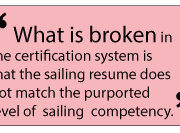
TWEET ABOUT

FIGHT CHILDHOOD CANCER
NauticEd is a fully recognized education and certification platform for sailing students combining online and on-the-water real instruction ( and now VR ). NauticEd offers +24 online courses , a free sailor's toolkit that includes 2 free courses, and six ranks of certification – all integrated into NauticEd’s proprietary platform. The USCG and NASBLA recognize NauticEd as having met the established American National Standards. Learn more at www.nauticed.org .

The NauticEd Vacations team are Expert Global Yacht Charter Agents – when you book a sailing vacation or bareboat charter through NauticEd, we don’t charge you a fee – we often save you money since we can compare prices from all yacht charter companies. PLUS, we can give you advice on which destination or charter company will suit your needs best. Inquire about a Sailing Vacation or Charter .
Online Sailing Courses Sailing Vacations | Charters Practical Sailing Courses Sailing Certification | License
Sign up for 2 FREE Sailing Courses Try sailing in Virtual Reality! Gift a Friend a Sailing Course Sailing Events | Opportunities
About NauticEd Contact Us NauticEd Support Privacy Policy
sailing certifications and licenses
- Sailing Vacations
- Sailing Opportunities
- Yacht Charter Resources
- Sailing Certifications and Licenses
These Are The Best Sailing Vacation Courses For You
Having fun and being competent on a sailing vacation go hand in hand. This is why we have put together these popular yacht chartering online sailing courses for you. These courses lead to bareboat certification and a sailing license accepted by yacht charter companies and port authorities worldwide.
BAREBOAT CHARTER MASTER RANK
Maneuvering under power course, coastal navigation course, bareboat charter short course, do i need a certification or a sailing license to charter .
Each charter destination varies as to government or Port Authority requirements. While a sailing license is required in some designations, what is definite, however, is that every location requires an adequate sailing resume to bareboat skipper a boat on charter. A sailing certification as a stand-alone document is simply not sufficient.
Required or not, it is prudent to gain the proper education and skills to bareboat charter. For this reason, NauticEd offers the SLC , a global sailing license that contains all the necessary elements to be legally licensed as well as competent. Start your SLC licensing process now. Purchase the required Bareboat Charter Master bundle of courses now.
Some terminology:
- A sailing certification is an acknowledgement and indication that the student has done some degree of training but it does not necessarily confer status of competence.
- A sailing license is not a certification; a license is an official document issued by a government recognized sailing body.
- A sailing resume documents any and all of your on-the-water sailing experience, any formal instructor training, and your theory knowledge.
Let’s go through the various charter destination requirements to discover how NauticEd can help you qualify to charter.
Mediterranean: All Mediterranean destinations require a sailing license and an adequate sailing resume.
Caribbean: No sailing license or certification is required in the Caribbean, BUT you must have an adequate sailing resume.
Pacific: No sailing license or certification is required in the Pacific regions such as French Polynesia, Australia, New Zealand or Tonga, BUT you must have an adequate sailing resume.
Belize: A rubber stamp license is required in Belize; this is organized by the charter company. In addition, you must have an adequate sailing resume.
Seychelles: The Seychelles require a sailing license and an adequate sailing resume.
Asia: No sailing license or certification is required in Asia. However, stay tuned-- some Asian countries are changing their requirements. You must have an adequate sailing resume.
How do I Gain a Sailing License?
There are two main government recognized sailing bodies who can issue a sailing license.
- NauticEd: Issues the SLC (Sailing License and Credentials).
- Royal Yachting Association (RYA): Issues the ICC (International Certificate of Competence).
NauticEd is the only USA sailing education body that is Coast Guard approved for administering sailing education and training that meets the American National Standards EDU-3. NauticEd holds very high standards for issuing its SLC license. The SLC is easy to get if and only if you know your stuff. For more details, see www.nauticed.org/SLC .
The ICC, another globally recognized sailing license, was created by United Nations under Resolution 40. NauticEd can facilitate you obtaining the ICC through our affiliation with the RYA. The ICC requires an on-the-water assessment; North American locations are limited, however, to Fort Lauderdale, Toronto, and Halifax. For details on gaining the ICC see here .
How do I Gain an Adequate Sailing Resume to Charter?
A charter company often determines competency by review of the charterer’s sailing resume, regardless of certifications or licenses. . A sailing resume describes your practical on-the-water sailing experience, your sailing knowledge education, any formalized training, and any skills assessments. NauticEd offers free sophisticated online software that will automatically generate a sailing resume and keep it in the cloud for you forever. See here for a detailed description of what defines an adequate resume for charter.
Why is a Sailing Certification Not Sufficient?
A sailing certification is different than a sailing license. No yacht charter company or Port Authority accepts a sailing certification as a stand-alone document verifying the competence of the Charterer. This is because of too many rubber-stamp-certifying bodies issuing such certifications without a real assessment of competence. There are no real zero-to-hero 7-day charter ready programs. While a certification is encouraged, a sailing certification is really an acknowledgement and indication that the student has done some degree of training, but it does not confer status of competence.
Get started now by purchasing the required Bareboat Charter Master bundle of courses now.
How do I Become a Competent Yacht Charter Skipper?
The process begins with the proper education and knowledge. The NauticEd Bareboat Charter Master bundle of courses is designed to provide this knowledge.
To charter a yacht on a sailing vacation, at a minimum, you need an appropriate sailing resume. An acceptable resume will show an appropriate amount of sailing experience as the master of the vessel on a similar sized vessel that you are wanting to charter, relevant sailing theory knowledge via courses you have taken, and any formal on the water training program if you have any. Without a doubt, you cannot substitute sufficient amounts of real sailing experience. You simply must have experience. We recommend at least 50 days; 25 at least as master of the vessel and 25 at least on a vessel greater than 28 feet. Some charter companies will let you get by with less, but we promote prudence. And prudence comes from experience.
So, if experience is the key to an appropriate sailing resume then how do you gain experience if you can't rent a boat to gain the experience? In this article we show 19 ways to gain experience without owning a boat.
Our highest recommendation for learning to charter a yacht on a sailing vacation is to charter the yacht WITH a professional captain for the first time around and at the same time take the NauticEd Bareboat Charter Master bundle of courses. If you’ve had plenty of sailing experience at home or other locations, then you can probably get away with the NauticEd online courses. If you feel that you have the confidence and competence, still, we recommend at least some formal bareboat type training in your local waterway with one of our practical training schools in addition to the NauticEd courses prior to heading out.
To begin, start with the Bareboat Charter Master bundle of courses now. You will be given a free electronic logbook to log any past and future experience which helps build your sailing resume.
What if I’m not fully ready yet?
If you’re not ready yet, start with the Bareboat Charter Master bundle of courses now which will give you essential knowledge to begin your journey.
There are so many opportunities to explore beyond being your own skipper that can give you a fantastic introduction to the world of sailing vacations. We have a variety of exotic sailing adventures, dedicated family adventures, long distance mile building adventures, and more for the novice and the inexperienced as well as the experienced wanting to stretch their sails a little more.
Or, see our Sailing Opportunities page where we list out the various types of exciting adventures and opportunities.
About NauticEd International Sailing Education
NauticEd is fully recognized by the United States Coast Guard as an official Sailing Education company providing on-the-water skills training and assessment and online theory knowledge courses which meet the American National Standards for boating training, EDU-3.
Additionally, global port authorities and yacht charter companies recognize the NauticEd SLC as an acceptable sailing license. In particular, countries in the Mediterranean and the Seychelles who rigidly require a valid legal sailing license accept the NauticEd SLC . Esteemed yacht charter companies such as The Moorings, Sunsail, Dream Yacht Charter, Navigare Yachting, Hermes Yachting, White Sails, Sailing Sicily, Waypoint, Astarea, Oasis Sailing, Spartivento, Angelina Yachting, Baotic Yachting, Ultra Sailing, Under the Heavens, NCP, MG, Orvis, Barcondo, EGO Charters, Istion, Thrace, Star Sail, Pitter, and other top quality charter companies recognize NauticEd as a leader in sailing education, certifications, and legal licensing.
You can be assured that NauticEd on-the-water training, its certifications, and the SLC license all meet and exceed global standards. It is no wonder that NauticEd students are our advocates.
How NauticEd works?
- Sailing Courses
- SLC - Sailing License
- Sailing Schools
- Practical Courses
- Boating Knowledge Base
- Fighting Childhood Cancer
- Free Courses Signup
- Gift a Sailing Course
- Sailing Licenses and Certifications
- About the Sailing Certifications
- Sailing Blog & Helpful Articles
- NauticEd Podcast Series
- School Signup
- Instructor Signup
- Affiliate Signup
- Boat Sharing Software
- Sailing Industry Services
- Support & Contact
- Privacy Policy
WE WANT TO TRAIN ALEX SO THAT YOU HAVE AN AMAZING EXPERIENCE
Thank you for your feedback!

Chartering Info For Crew / Owners

USVI Marine Bulletin is available at www.vi.gov/resources
Is your vessel a U.S. Flagged UPV legally operating with the correct number of passengers with the correct documentation?
Always consult USCG Sector San Juan for the latest updates and information regarding your vessel’s compliance.
See the USCG website for official advice, this is a guideline for the minimum standards of compliance only.
For further information on Bareboat Charter Agreements see this link.

Uninspected Passenger Vessels
The law surrounding chartering in the USVI is complicated by the fact that under the Jones Act and the Passenger Vessel Services Act [“PVSA”] the USVI is deemed to be a FOREIGN port.
However, under the Immigration and Nationality Act (“INA”), the term “United States” includes the USVI and it is deemed a DOMESTIC territory.
Please understand the below general information is provided for informational purposes only. VIPCA is not able to offer legal advice to its members or others. You are encouraged to seek the assistance of counsel in order to receive answers to your particular issue or situation.
Click here for the USVI Marine Bulletin for 2022 updated regulations pertaining to yacht charter
For U.S. flagged vessels operating in the U.S. Virgin Islands 7-12 passengers:
- OUPV 6 Pack license – see base of this page for more info from the USCG
- CPR & First Aid
- Random Drug Testing Program
- Yellow Code COI (MCA Power) or Blue Code COI (MCA Sail)
- US Citizenship or Green Card (CBP) if remaining in the USVI
- Boat Registration (DPNR Div. Enforcement) *
- Anchor/Mooring Permit (DPNR Div. Enforcement )
- Business Licence (DLCA)
- National Park Sticker (NPS)
*Re-direct to DPNR website
DPNR Full Mooring INSTRUCTIONS BOOKLET for download
Click here for BVI Crew Requirements Upgrade to Masters Captains License

If your vessel is Foreign flagged and your crew are US citizens:
If your vessel is Foreign flagged and your crew are NOT US citizens:
Foreign-flagged vessels with foreign crew may not charter in the USVI (or between the USVI and Puerto Rico). A foreign-flagged vessel with foreign crew may embark and disembark guests in the USVI so long as there are no interim stops in US waters along the way with guests onboard. The captain must hold a valid license equivalent to a USCG Master 100 ton issued from a source appropriate to his/her nationality.
If your vessel is US flagged and your crew are US citizens or Green Card Holders:
A OUPV 6 Pack license / Masters License is required (other international licenses are not accepted alone by the USCG
IMMIGRATION
VISAs for foreign flagged/foreign crew :
Info for C-1/D visas: https://travel.state.gov/content/travel/en/us-visas/other-visa-categories/crewmember-visa.html
Note: Crew on a private non-charter megayacht are not eligible for a D-1 Visa if the yacht will be cruising in US waters for more than 29 days, so those crew often obtain a B1/B2 Visa.
Per confirmation in 2019 from the local CBP Director, foreign yacht crew may utilize a B1/B2 visa for both:
- Private yachts, not for commercial or charter use
- Yachts engaged on charter – SUBJECT TO the vessel embarking its guests in the USVI, and proceeding directly into foreign waters for the charter itself. Similarly, guests can be disembarked in the USVI, as long as the charter itinerary has been out of US territorial waters.
Crew are urged to obtain both a B1/B2 and a C-1/D out of an abundance of caution, however please note:
- Yachts should avoid having a mix of B1 and C1/D visas amongst their crew, as it will cause confusion as the yacht’s status with CBP (individual crew having both the B1/B2, and C1/D visas granted to them is fine; different crew having different visas is to be avoided).
- Third party advice for the do’s and don’ts for foreign crew applying for a B1 visa: here
C-1/D visas are valid for 29 days stay, upon which the vessel must depart to a foreign port. The BVI is accepted as a foreign port.
ROAM system continues to be for private US boats only.
- For US owned and flagged vessels with US persons crew : there are no restrictions to entry into the USVI waters and cruising those waters, whether without charge or on charter for a fee. Such vessels can be registered in the USVI for homeporting management purposes and be licensed for chartering by the USVI Govt. without issue.
- For foreign owned or flagged vessels with US persons crew : these vessels may enter the USVI and cruise USVI waters with no immigration restrictions on operations so long as the vessel makes the appropriate entry and the passengers on the vessel comply with applicable immigration documentation, if any. Such vessels can be registered in the USVI for homeporting management purposes and be licensed for chartering by the USVI Govt. without issue.
- For foreign owned or flagged vessels with non-US crew: these vessels may enter the USVI and cruise the USVI waters so long as crew have H-1/B-1 visas and no chartering fees are paid; or the vessel is used by the owner and guests at no charge.
- For foreign owned or flagged charter vessels with non-US crew : these vessels may only enter the USVI for purposes of picking up or dropping off passengers and provisioning or undergoing maintenance. Chartering or establishing registration for homeporting is strictly prohibited and contrary to Immigration law. There are presently no visas applicable to this scenario. And we cannot seek to attract such vessels to homeport in the USVI.
Footnotes /Further Reading:
Arrival into the USVI – USCG Marine Requirements: For vessels entering the USVI from a foreign port or departing the USVI to a foreign port with passengers for hire, the master and crew must have all of the required license credentials and STCW endorsements, including Master level license and STCW A-II/3 endorsement for the master and, for all crew, STCW Basic Training and all other required STCW endorsements depending on vessel size, passenger count and type. This would include foreign and USVI based charter vessels and water taxis.
Arrival into the USVI – Department of Health Requirements: All domestic travelers and international travelers are no longer required to complete the USVI Travel Screening Portal or present an approved green QR code to travel to the USVI. Additionally, f rom June 12, 2022, air passengers no longer need to get tested and show the COVID-19 test result or documentation of recovery from COVID-19 prior to boarding a flight to the U.S. with the USVI following federal guidances.
TWIC cards: All merchant mariner license holders should already have their TWIC card. Renewal after five years is the same as the original enrolment process to be commenced 40 days before its expiration date.
Renew your business license online : The Department of Licensing and Consumer Affairs will contact the Bureau of Internal Revenue on your behalf to obtain your tax clearance letter. DLCA will then contact you requesting payment. Be sure to have the applicable business license for the conduct of charter boat services and renew annually.
Boatmaster’s and Radio license: The costs of the radio licenses are $10 for operator and $30 for station license. Make sure you have the serial number and make of the radio. You will need a physical for the boatmasters license. This can be easily obtained ($40) at the B & F Medical Complex near Sea Urchin. You will need four passport photos. Get them for Top Photo near the doctor’s office ($15).
Drug Testing: All licensed mariners & crew operating uninspected passenger vessels must meet the drug & alcohol testing requirements in 46 CFR 16
Virgin Islands National Park: includes much of the water and sea floor surrounding St. John. If you are visiting by boat or operating a vessel in National Park waters, please familiarize yourself with the policies and regulations about these marine resources. This map provides you with an interactive way to familiarize yourself with the resources. You can also view the Superintendent’s Compendium for detailed information.
U.S. Coast Guard Requirements:
US FLAGGED VESSELS IN USVI WATERS
6-Pack Vessels
Vessels under 100 gross tons operating in US Virgin Islands waters can carry no more than 6 passengers as uninspected vessels commonly call “6-pack” vessels, see 46 CFR Subchapter C. In 2014, the Howard Coble Act allowed all 6-pack vessels in the USVI to carry up to 12 passengers if the vessel was in compliance with the UK Blue or Yellow Code, see 46 USC 4105. The UK Blue / Yellow Code is now consolidated under MGN280; however the US law and USCG policy still refer to Blue or Yellow Code, hereinafter “the Code.” UPV’s are regulated but not inspected, hence the term uninspected vessels, and are not issued Certificates of Inspection (COI). Vessels that carrying between 7-12 passengers can carry documentation showing compliance with the Code and are not required to obtain a Certificate of Inspection (COI), while vessels without proof of compliance are required to obtain a COI.
Third Party Organizations
The USCG requires vessels carrying between 7-12 passengers to comply with the Code. The USCG relies upon certificates issued by the Flag state third party organizations (TPO) to verify the vessels are compliant. In the case of US flagged vessels, the USCG relies on recognized TPO’s. The Commercial Vessel Licensing Authority (CVLA) operated by Chad Blake from the USVI is recognized by the USCG to conduct these exams and issue documentation. Mr. Chad Blake is an Associate Member into the International Institute of Marine Surveying (IIMS). The IIMS is a certifying authority by the MCA to appoint persons for the purpose of examining vessels and issuing certificates to vessels in compliance with the Code. After the BVI stopped issuing certification in late 2021 to US flagged vessels, the USCG began accepting CVLA documentation to demonstrate compliance with the Code. The BVI has recognized other TPO’s from Jamaica, the Bahamas, and the Turks and Caicos.
T and K Vessels
The USCG inspects and regulates vessels carrying over 6 passenger, if not in compliance with the Code, or vessels carrying more than 12 if in compliance with the Code. These vessels must carry a valid COI. Vessels under 100 Gross Tons are inspected and regulated under 46 CFR Subchapter T, carrying 150 or less passengers, or 46 CFR Subchapter K, if more than 150 passengers. In order to obtain a COI a vessel must submit the necessary plans to the Marine Safety Center, undergo a USCG inspection, and stability test. Foreign flagged yachts engaged in carrying 12 or fewer passengers that are between 100 and 300 Gross tons are treated as UPV’s, see 46 USC 3301 and CVC Policy Letter 15-04.
COASTWISE SHIPPING
Coastwise shipping regulations, also known as cabotage laws and in the Jones Act in US waters, do not extend to the US Virgin Islands. see 46 USC App 877. As a result there is no law prohibiting foreign documented vessels from operating or engaging in coastwise trade in the waters of the U.S. Virgin Islands. Only within USVI waters are foreign documented vessels allowed to operate, they cannot operate in Puerto Rico or the US mainland. Certificate of Documentation Exemption UPV’s operating in USVI waters are not required to hold a Certificate of Documentation (COD). Vessels without a COD less than 5 net tons must have a State Number or certificate issued by the issuing authority. See 33 CFR 173.21.
US re-flag for vessels under 200 Gross Tons
A vessel that is sold or placed under a foreign registry and that is less than 200 Gross Tons can be eligible to reflag US for operation solely within USVI territorial waters. See 46 USC 12132. The vessel operator must contact the National Vessel Documentation Center and follow their process. There is no limit to the number of times a vessel under 200 Gross Tons may re-flag US. For example, a vessel under 200 Gross Tons (a UPV, T or K vessel) may depart USVI waters, re-flag in the Turks and Caicos to operate in their waters. That vessel may return to the USVI waters, re-flag US and operate here. There is no time limit so these vessels can change operational areas with the change in tourist seasons.
FOREIGN FLAGGED VESSELS IN USVI WATERS
US law requires the inspection and certification of certain passenger vessels which embark passengers in US ports. see 46 USC 3301. Foreign vessels that do not comply with the Safety of Life at Sea (SOLAS) are prevented from departing a US port with US passengers. see 46 USC 3505. The law provides reciprocity if the vessel has a SOLAS Passenger Ship Safety Certificates (PSSC), if the vessel does not have a PSSC then it must apply for a US COI. This includes plan review, construction oversight, stability tests, and a USCG inspection.
12-Pack Vessels
Foreign flagged vessels can carry 12 or less passengers if they are in compliance with the Code, in order for a foreign flagged vessel to carry more than 12 passengers in US waters they are required to meet 46 CFR Subchapter T or K requirements, as applicable. Foreign flagged vessels may carry passengers in US waters because the Jones Act does not apply to USVI waters. The USCG COI is for domestic service in US waters and not for a SOLAS international route.
DEFINITIONS:
Uninspected Vessels
- Passenger Count
a. Vessels without a Yellow/Blue Code carrying 6 or less passengers
b. Vessels with Yellow/Blue Code carrying up to 12
- Certificates
a. Proof of compliance with Yellow/Blue Code issued by Flag State or recognized Third Party Organization if carrying between 7-12 passengers
b. Vessel to be under the direction and control of an individual licensed by the
Coast Guard Inspected Vessels
- Vessels without a Yellow/Blue Code carrying more than 6 passengers, or vessels with Yellow/Blue Code carrying more than 12
a. USCG Certificate of Inspection
b. Operator to hold USCG Merchant Mariner’s Credential (MMC) of at least Master
Clearing into the US Virgin Islands

- Documentation of nationality for each passenger / crew member
- Ship’s documents
- Vessel Entrance or Clearance Statement (CBP Form 1300)
- Passenger and Crew List (CBP Form I-418)
- Clearance from the last port of call
Clearance Ports in the U.S. Virgin Islands:
- Edward Wilmoth Blyden Marine Terminal, St. Thomas 877.305.8774 8am – 5pm Seven Days a Week
- Cruz Bay CBP Terminal, St. John 877.305.8775 10 – 5pm Seven Days a Week
- Red Hook Ferry Terminal, St. Thomas 8 – 5pm by foot only (excluding lunch 12 – 1pm) berth at American Yacht Harbour or anchor in Vessup Bay and utilise the AYH dingy dock
- Gallows Bay, St. Croix 340.773.1011 8 – 5pm Mon – Fri, after hours 340.773.1490
Other Government Office Contacts:
- http://dpnr.vi.gov/environmental-enforcement/
- 8100 Lindberg Bay Ste. 16 Cyril E. King Airport, Terminal Building 2nd Floor St. Thomas, VI 00802
- Phone: (340)-774-3320
- Fax: (340)-714-9527
- Tel. (340) 776-3497 ext. 200 Tel. (340) 776-3497 ext. 209
- Fax. (340 774-1687
- Mailing Address: 3300 Veterans Drive, St. Thomas, VI 00802
- #5 Calle La Puntilla Final, San Juan, PR 00901-1800
- https://www.uscg.mil/sectorsanjuan/
- Hours of Operation 0700 – 1130 | 1230 – 1530
- NON-EMERGENCY CALLS TO SECTOR SAN JUAN (787) 729-6800
- EMERGENCY CALLS SECTOR SAN JUAN 24-HOUR OPERATIONS CENTER. Search & Rescue, Law Enforcement, Marine Casualty, Oil/HAZMAT Spill, Port Security or other Marine Emergency Report (787) 289-2041
- http://drna.pr.gov
- Carretera 8838, km. 6.3, Sector El Cinco, Río Piedras
- Teléfonos: 787-999-2200
Please understand the above general information is provided for informational purposes only. VIPCA is not able to offer legal advice to its members or others. You are encouraged to seek the assistance of counsel in order to receive answers to your particular issue or situation.
- About Sailonline
The One Source For Yacht Charters And Charter Yacht Ownership

- What is boat chartering
- Choose your best charter type
- Choose your charter company
- Choose a cruising area
- Choose the right boat
- Booking your charter
- Your sailing resume
- Yacht Charter Destinations Chart
- Catamarans vs. monohulls
- Bareboat Destination Skills
- Sailing Area Table
- Caribbean weather info
- What to pack for your charter
- Charter boat checklist
- Internet access on charter
- Briefing your charter crew
- Saving money on charter
- All boat charter tips in 1 file
- Budget Charter Fleets
- Provisioning a charter boat
- Booking directly with a boat owner
- The charter days you really get
- Managing your boat on charter
- Boat charter with kids
- Seasickness tips
- Starting a charter from the USVI
- If you damage a charter boat
- Flotilla charters
- Charter with a handicapped child
- Crewed yacht charter myths
- Organize a crewed charter
- Crewed charter tips
- Browse The Database
- Submit your Boat Listing
- Yacht Management Contract
- Buying a boat with a partner
- Bareboat vs. crewed yacht
- Charter Yacht Phase-out
- Phase-out punch list
- Yacht & Marine Surveyors
- Charter Boat Owners forum
- Yacht financial management tools
- 2nd tier fleets financial comparo
- Active ownership FAQ
- Layman guide to charter boat ownership
- Is Buying A Charter Boat For You?
- Buying a used charter boat
- Yacht buyer representation
- Bareboat vs. crewed yacht ownership
- Active Yacht Ownership
- Customers' Testimonials
- Cruising Logs
- Captain licenses
- 'Heaving to' maneuver: A must
- Charter Boat Seamanship Manual
- Yacht Crew Certification: All answers
- Snorkeling & kayaking safely
- Rules of the Road
- MOB Crash-Stop Maneuver
- 5 Knots you must know
- Flag Etiquette
- Emergencies on charter
- Distress calls at sea
- Navigation on a yacht charter
- Navigation aids sheets
- Estimate distances at sea
- Heavy weather basics
- Caribbean weather information
- VHF use: The basics
- Raising Main Sail | UnPC
- Anchoring technique & hand signals
- Catamaran sailing tips
- Docking: Avoid the embarrassment!
- Mooring technique
- Med-mooring technique
- Dinghy handling: make the best of it!
- Reefing a Catamaran
Remember Me
- Forgot your password?
- Forgot your username?
- Create an account
Yacht Crew Licenses & Certifications: Q & A

Captain Mark Fry, of International Yacht Training , answers your questions.
Q : How does one substantiate the requirement of actual cruising time as a qualification for the "6 Pak" license? I have been boating for at least the last 15 years and have substantial hours, however I never maintained a log. I am afraid that this requirement has and will keep guys like me from going for their licenses. Thanks, Dick B.
A : To substantiate sea time for the US Coastguard "6 pack" license on your own vessel, you are required to complete the "small vessel service form" from the USCG. As the owner of the yacht you can sign off your own sea time and have it notorised from someone who can substantiate it such as a dock master, yacht club commodore or such like. If you are not the owner of the boat(s) where you have done your sea time, you must, unfortunately, have each individual boat owner sign each form; then each form must be notarized. Needless to say, this can be a very difficult and tedious task.
____________________________
Q : I am interested in starting a crewed charter business either based in BVI or AVI 1) Is their any captain licence that covers both or do I need two Licences? I am currently located in Newark, DE. USA. 2) Do you have any sugestions for me as far as schools or study guide courses? 3) I have plenty of sea time but mostly on smaller yachets. How can I gain my tonnage ratings for large sailing vessels 100 - 200 Ton Master? David M.
A : It is very interesting that you have brought up this question at this time. The British Virgin Islands passed a law on Feb 1st 2005, that any vessel chartering in their waters must have a qualified Captain on board with a qualification recognised by the BVI. Here at IYT, we issue dual certification for American citizens. That is a 200 Ton Yachtmaster Offshore certificate and a USCG 200 Ton Masters license. This helps satisfy both administrations so you can work in both the BVI and the USVI. IYT holds the dual Yachtmaster course once a month in our Ft Lauderdale facility. Details of entry level requirements, course schedule and pricing can be found on our website.
Q : Is it true that boat insurance goes up dramatically when one obtains a Captains License? We have heard this, but would think that the opposite should be true - that a licensed captain should be a lower risk. Rebecca V.
A : You are absolutely correct, there are a number of companies that will give you a reduction in your boat insurance if you hold a Captain license or a recognized certificate of competency. But like car insurance, you should shop around for the best deal.
Q: How do I get an International Certificate of Competency (ICC) to charter in Spain? William C.
Here at IYT in Ft Lauderdale, we are licensed to issue ICC's on behalf of both the U.K. and the Irish Governments. Generally speaking however, you must be a resident of one of these countries in order to obtain an ICC. We are trying to find out how we can issue ICC's on behalf of the US Coastguards but so far have been unable to get a satisfactory reply. We have also requested permission from the Irish Government to issue ICC's to non-Irish residents and are currently awaiting a reply. If we get permission to issue ICC's in the US from the Irish Government, then as part of the EU this certificate will be good to charter anywhere in Europe. You will be able to obtain this certificate here is the USA. As soon as we get an answer we will update you.
Q : I'm a bit confused...."Yachtmaster" is a registered Trade Mark of the UK's Royal Yachting Association. Your website doesnt even mention the RYA and you seem to have no affiliation with it!! As a long term holder of RYA certification, I would not like to see my qualifications degraded or indeed the Yachtmaster Offshore or Ocean tickets confused with anything other than the "real thing"! Tony N-W
A - Hi Tony, International Yachtmaster Training ( IYT ) is a U.S. Corporation and has absolutely nothing to do with the British recreational yachting organisation called the Royal Yachting Association or RYA. This is why there is no mention of it on our website. The term "Yachtmaster" actually belongs to the British Maritime and Coastguard Agency (MCA) who were the first to coin the phrase and issue yachtmaster certificates as the Board of Trade as far back as 1932. In 1973, RYA were given permission to issue "Yachtmaster " certificates by the MCA. In 1999, International Yachtmaster Training was also given permission by the MCA to issue "MCA Recognised Yachtmaster certificates. Yachtmaster certificates are also issued by the Australian Yachting Federation, the Irish Sailing Association, the Cruising Association of South Africa and the Canadian Yachting Association although their certificates are not recognised by the MCA. All of these organisations are recreational yachting associations run by recreational yachtsmen and they issue recreational yachtmaster certificates. Some of these organisations issue yachtmaster certificates with a "commercial endorsement", and certain administrations question the authority of recreational yachting organisations to issue "commercial" certificates.
International Yachtmaster Training on the other hand, is a professional yachting organisation, fully approved by Det Norske Veritas as a Maritime Training Center of Excellence. It is run by professional yachtsmen and we issue professional, commercial Yachtmaster certificates. Our standards are higher than the other organisations including the RYA, as they are fully compliant with the International Maritime Organisation rules for the Standards of Training and Certification of Watchkeepers, or STCW as it is commonly known. IYT does not allow "direct entry" into its examination system as the RYA do, one has to actually sit our courses to obtain our certification. All of our examiners worldwide are professional mariners, not so with the RYA.
The IYT Yachtmaster program is so successful, it is now recognized by 24 Governments worldwide including not only the MCA but also the U.S. Coastguard among others. The demand for our certification as a standard of excellence is such that we now have 33 licensed schools in 20 different countries and this is growing every week. With regard to the RYA registered trademark in the U.K., it is interesting to note that the MCA, who coined the phrase, refuse to recognise the RYA registration. The "International Yachtmaster Training" name and logo, is however a federally registered trademark in the United States.
In conclusion, the IYT Yachtmaster Certificates have become the certificates of choice throughout both the professional international yachting community and recreational yachtsmen. Their compliance with the STCW convention for Basic Safety Training and insistence on completion of all aspects of the training courses ensures a well qualified individual trained to professional international standards. So Tony, when you are ready for the "real thing", contact us, you will be pleasantly surprised.
Q - I keep my boat in Belize. We plan to cruise the Caribbean in a few years (live aboard). Is there any good reason to get my 6-pack license in this case? Mark P.
A - The U.S. is the only country in the world that issues a "license" to drive a boat. All other countries issue a "certificate of competency" which includes a practical examination to prove that you are competent to command a boat. There is no reason to get your six-pack license unless you intend to operate your boat as a commercial charter boat in the US Virgin Islands. The Coast Guard License is only a requirement is you wish to carry passengers for hire or reward in the U.S. or U.S. territories. It consists of a series of multiple choice questions. It is also largely unaccepted overseas as there is no practical component to the training and no "on the water" examination. The most internationally recognised qualification for yachting is the IYT Yachtmaster certificate which also carries a reduction in your insurance if you hold such a certificate.
Q - I intend to operate a charter boat on the USVI. I heard that the USVI have special regulations, different from the USA. What kind of license is needed in those islands? Does the boat have to be US flagged? Knowing that I will be based from the USVI, am I allowed to do charterers pick ups in the BVI? Thank you very much. Joe S.
A - If you are going to be chartering in the USVI, you need to be qualified to US Coastguard standards. This would mean a "Six-Pack" license or similar to take paying passengers aboard your vessel. It is always in the best interests of your qualifications to complete the 5 day Basic STCW training courses (not the 3-day version), which will be acceptable to the BVI. With regard to where you flag the vessel, the best people to talk to are the US Virgin Islands Charter League. You can contact Pamela Wilson at 1.800.524.2061. With regards to being able to pick up charterers in the British Virgin Islands, there have been some changes recently so I would suggest you contact the British Virgin Islands Maritime Authorities for their most recent update.
Q - As a professional skipper, I have been asked several times if I could perform a wedding on my boat, which is based in US waters. If I do, can I deliver a valid wedding license? What is the real validity of this whole thing and how does it REALLY work? Or is it just a gimmick? Please elaborate since it could be an interesting marketing tool for my business. Sincerely, Capt. Gene
A - It was once possible for a ship Captain to marry people at sea. However, this is no longer the case. There are extreme cases where a couple could be married in dire circumstances such as a sinking vessel or someone about to die. But this could only be done in International waters. It is however possible to marry someone on your boat inside territorial waters (3 miles ) provided the person giving the ceremony is duly qualified to do so by the State, such as a public notary. I was married aboard a yacht 7 years ago here in Ft Lauderdale. I would suggest contacting the State authorities to find out how this could be done, it is rather good fun to do so.
Q - I am starting a Skippered Yacht Charter business in St. Vincent & the Grenadines later this year and I see a lot of comments about the "6-pak" license requirements. I am qualified to RYA Yachtmaster Offshore. Do I need any further qualifications (over the YM) to operate the business in SVG ? Graham
A - The "six-pack" license that you refer to is a U.S. Coastguard license which is required for operating vessels that carry up to six people in U.S Territorial waters. This includes the United States mainland and the U.S. Virgin Islands. It can only be taken by U.S Citizens and will be of little or no value to you in St Vincent and Grenadines.
Q - What are the qualifications needed by the different Caribbean countries to run a crewed charter yacht?
A - This is a matter for the Flag State Authority or Maritime Authority on each Island. The problem is there are many different countries involved. There are U.S. British, Dutch, French, Bahamas and all the independent islands who make their own decisions on what qualifications are acceptable for which yachts.
The qualifications will depend on the status of the yacht, whether it is private or commercial (this means engaged in trade or accepting money for a charter), the Flag State or where the yacht is registered, the tonnage of the yacht, whether it complies with a classification society for safety and construction, the number of guests it will carry, whether it is power or sail, its compliance with the code of safe working practices and sometimes the nationality of the crew and / or the number of crew it will carry.
There is also the issue of work permits from the various islands. For instance, one might be suitably qualified to run a charter yacht out of the British Virgin Islands but without a Work Permit from the V.I. Government to do so, it could mean big trouble. The same applies from the U.S. Virgin Islands.
A lot of people think that they can buy a yacht and suddenly start a charter business in the Caribbean. Having spent 6 years running commercial yachts throughout all the islands, I would strongly recommend conducting some research before embarking on such a venture.
Lastly, with regard to RYA Yachtmaster certificates, I would caution that a number of Flag States (including the French Islands) will not accept the RYA Yachtmaster certificates even with a commercial endorsement as they do not believe that a recreational sailing organisation with no quality management system and no auditing requirements in place should have the authority to issue commercial certificates. They also do not comply with the STCW convention as laid down by the International Maritime Organisation.
Before deciding to run a commercial yacht in the Caribbean, I would strongly suggest contacting the Government of the Island to find out as many rules and regulations as possible. The number of yachts doing so is strictly governed, otherwise there would be a "free for all" with no controls in place.
Q - I have limited (almost none) sailing experience. I would love to bareboat charter. How much experience is needed before a bareboat charter company will turn the boat over to you. Were do you get experience? I know a course would be in order but if I go to the expense of a course that leads to a bareboat certification is that enough?
Depending on where you live, approach a reputable sailing school (there is no other way to do this). I recommend Offshore Sailing School ( http://www.offshore-sailing.com ). They have many outlets all around the country. Or any Certified ASA school.
Q - A quetion about lowering flag from a yacht club yard arm has arisen here in Marblehead, MA. Specifically, the Canadian flag was flown from the yardarm before and during the Marblehead-to-Halifax ocean race recently. Clearly, the U.S. ensign is the last to be lowered ceremoniously, as you say. But which of the other two that flew should be lowered first, the Canadian flag or the yacht club's burgee? Bud P.
A - The flags should be lowered as follows 1) Club burgee first 2) Canadian flag second 3) US Flag last
Q - I understand that with a US flagged vessel I could operate a charter vessel outside US territorial waters without the need of the "six-pack" license, am I correct? And in the event the charter is based in one of the "non US" Caribbean Islands, is it the authority of the starting island of the charter that gives permission to Charter or do I need a permit from every other "island country" on the way, if it is different than the one at the start of the charter??
A - To run a charter yacht, you are required to comply with Flag State regulations irrespective of where in the world you operate. To operate a US flagged yacht, you would need to be US Coastguard qualified such as a 50 ton or "6 pack". Other islands have the authority to confine a charter boat to harbor if the Captain is not properly licensed. I would also doubt very much if an insurance company would insure you to operate a charter yacht without the proper license as the insurance would probably be void if there was an accident.
- PREMIUM FILES
- Pre-Owned Yachts
- Charter Boat Owners/Buyers Forum
- Favorite Links
Most read articles
- Boat flag etiquette
- VHF Radio Basics
- Catamarans - Monohulls: Pros and Cons
- Charter Boat Ownership for Dummies
- Charter Boat Owners Group
Copyright ©2000 - 2022 Sailonline.com. Unauthorized reproduction prohibited. Sailonline is not affiliated with any charter company.
Please use a modern browser to view this website. Some elements might not work as expected when using Internet Explorer.
- Landing Page
- Luxury Yacht Vacation Types
- Corporate Yacht Charter
- Tailor Made Vacations
- Luxury Exploration Vacations
- View All 3600
- Motor Yachts
- Sailing Yachts
- Classic Yachts
- Catamaran Yachts
- Filter By Destination
- More Filters
- Latest Reviews
- Charter Special Offers
- Destination Guides
- Inspiration & Features
- Mediterranean Charter Yachts
- France Charter Yachts
- Italy Charter Yachts
- Croatia Charter Yachts
- Greece Charter Yachts
- Turkey Charter Yachts
- Bahamas Charter Yachts
- Caribbean Charter Yachts
- Australia Charter Yachts
- Thailand Charter Yachts
- Dubai Charter Yachts
- Destination News
- New To Fleet
- Charter Fleet Updates
- Special Offers
- Industry News
- Yacht Shows
- Corporate Charter
- Finding a Yacht Broker
- Charter Preferences
- Questions & Answers
- Add my yacht
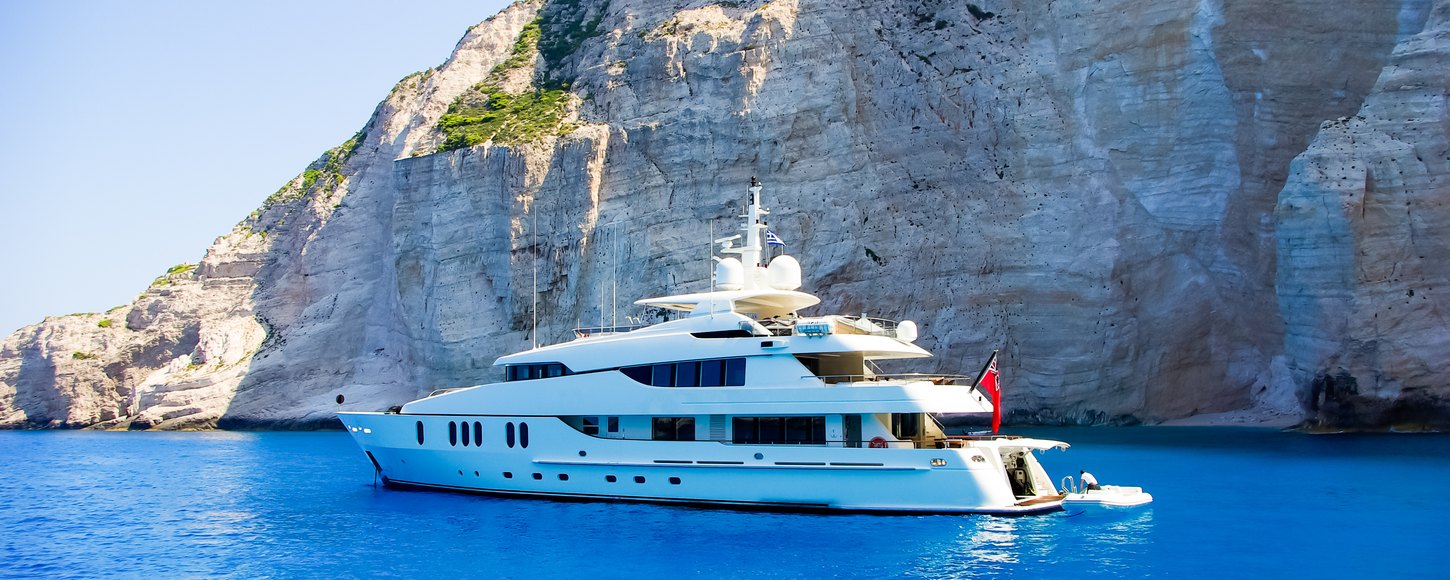
- Yacht Charter Fleet
- Luxury Yacht Charter Advice
Greek Charter Licences Explained
Benefits of a greek charter licence.
- Share this on Facebook
- Share this on X
- Share via Email
By Editorial Team 24 January 2023
In 2017, Greek authorities changed the regulations surrounding yacht charters, meaning that all EU-flagged and non-EU flagged yachts over 35 metres being commercially operated, i.e. available for charter, must hold a Greek Charter Licence to cruise exclusively within Greek waters.
In this article:
Yacht charters in Greece
Greek charter licence: the basics, vat rates in greece, vat on time spent in international waters, new e-charter permit, can yachts without a gcl or e-permit cruise in greece, need more advice.
As a charterer, you might be interested to learn that there are a number of perks in chartering a yacht that holds this certificate. Read on to learn about Greek Charter Licenses (GCL) and how they can benefit you.
Greece yacht charters have become increasingly popular over the years, and it’s clear to see why; boasting year-round sunshine, a wealth of historical monuments and World Heritage sites, not to mention world-class beaches, astonishing scenic beauty and renowned warm Greek hospitality, it’s small wonder it has become one of the most popular yacht charter destinations on the planet.

As a result of increasing competition from foreign-flagged vessels conducting commercial charters in Greece, the Greek authorities decided to impose new measures in order to assert greater control over who could charter in their waters, thereby protecting their own commercial fleet.
In November 2017, the Greek parliament passed a new law introducing significant changes to the commercial charter sector, ending old cabotage rules and giving rise to the Greek Charter Licence .
The news rules state that owners of EU flagged yachts, and non-EU flagged yachts over 35 meters, wishing to conduct commercial yacht charters in Greece must now hold a Greek Charter Licence.
In order to procure a licence for the yacht, the owner must first jump through several hoops, including;
- Securing a foreign commercial yacht inspection certificate
- Applying for VAT exemption and trading as a Greek licensed foreign-flag commercial yacht
- Obtaining a Greek Tax Identification Number
- Establishing a tangible presence in Greece (although this step can be mitigated using a local charter management company)
The yacht must also conduct a number of commercial charters in Greek waters, calculated by a predetermined amount of days over a 3-year period, which decreases in line with the age of the yacht.
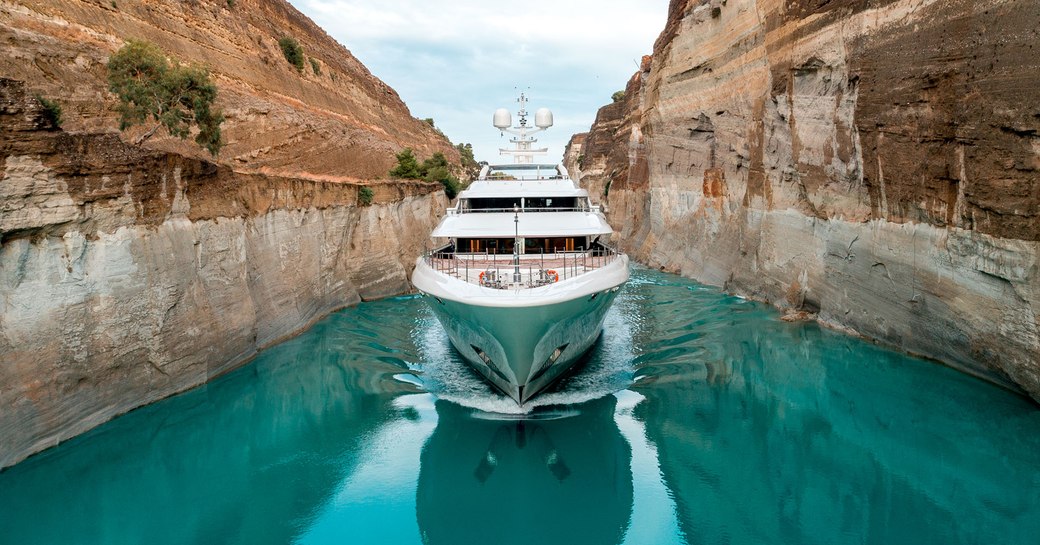
Once they have successfully completed the process, which can take roughly between 1-2 months, they will be granted a 3-year licence, subject to conditions.
As a charterer there a number of benefits that you can enjoy when you rent a yacht with a Greek Charter Licence for cruising around Greece, chiefly;
- Reduced VAT (see below)
- Free embarkation and disembarkation from any Greek port
- Fuel is either purchased duty-free or net of VAT/local taxes
- Freedom to cruise anywhere within Greece waters (with no formalities required)
Officially, the current VAT rate in Greece is 24%, although this has been temporarily reduced to 13% in June 2020 under "services of transport of people and their luggage", and applies to all yachts (over 24 meters) cruising exclusively within Greek waters. This reduced rate has been extended further until 31 December 2023, which is great news for those hoping to enjoy a yacht charter around Greece this summer.
For voyages that include time spent in international waters, VAT is calculated based on the following;
- For yachts cruising international waters without approaching port, the VAT discount is 60% (payable at a rate of 5.2% of the yacht’s base charter fee)
- For yachts that depart from a Greek port and conduct long navigations, the VAT discount is 50% (payable at a rate of 6.5% of the yacht’s base charter fee)
- For yachts that depart from a Greek port and conduct short navigations, the VAT discount is 40% (payable at a rate of 7.8% of the yacht’s base charter fee)
- For yachts that spend any time in coastal international waters, the VAT discount is 30% (payable at a rate of 9.6% of the yacht’s base charter fee)
Currently, possibly due to a lack of resources, the flat VAT rate of 13% is being applied to all yacht charters, regardless of spend time in international waters, avoiding the need for complicated calculations.
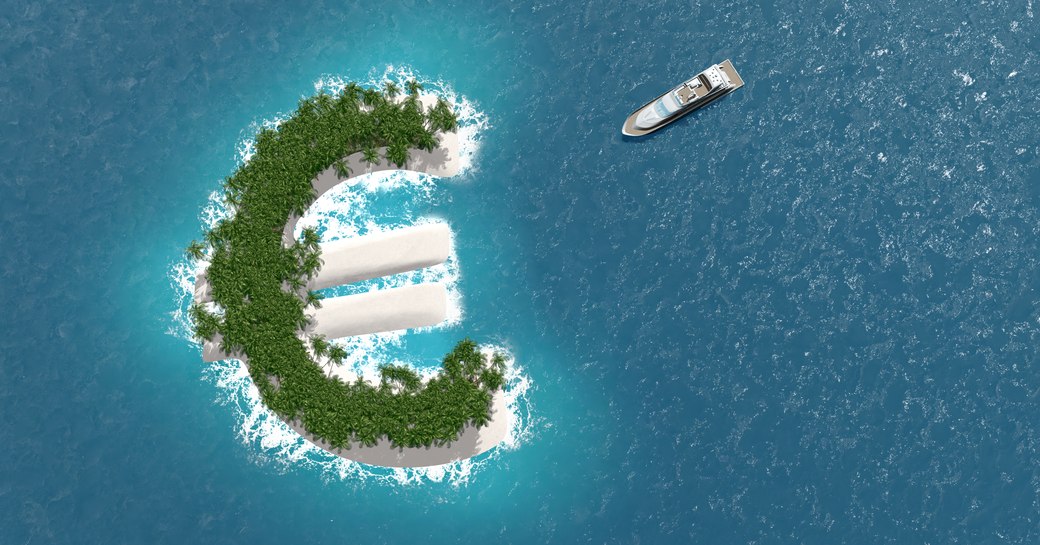
Overall, these discounts can equate to a substantial saving for the charterer, and coupled with the spectacular cruising grounds on offer in Greece, you can start to see why yachts that carry a Greek Charter License hold massive appeal.
In April 2022, the Greek government introduced its new e-Charter Permit for foreign-flagged yachts wishing to cruise its waters.
In essence, the new electronic permit allows foreign-flagged yachts – measuring over 35 metres LOA – to begin and end charters in Greece for a maximum of 75 days over a 3-year period, without having to obtain a Greek Charter Licence or establish a tangible presence in Greece.
This greatly simplifies charter operations for foreign-flagged vessels wishing to charter in Greece for a limited period. It should be noted that the usual VAT rules outlined above still apply.
In a nutshell, yes, provided the charter starts and ends in international waters, such as in Italy or Albania for charters wishing to incorporate the Ionian Islands , or Turkey for itineraries that include the Aegean archipelagos.
In this case, the yacht is not required to hold a Greek Charter Licence or e-Charter Permit, but will be liable to VAT in the country of embarkation.
Please note that the rules regarding VAT, permits and itineraries incorporating travel outside of Greek waters are continually evolving, therefore we advise that you speak with your yacht charter broker for further clarification before you travel.

To learn more about travelling in Greece on your luxury yacht charter, please read our comprehensive Greece yacht charter destination guide , which offers lots of useful information and tips.
For any further information about booking or chartering a luxury yacht, please take a look at our comprehensive advice guides .
Related advice articles

- Share on Linked In
Yacht Reviews
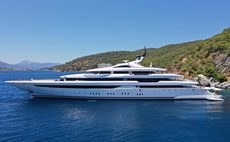
- See All Reviews

Charter Yacht of the week
Start Planning - Speak with a Charter Expert
Our charter experts will:
- Discuss your vacation plans
- Check availability & shortlist suitable yachts
- Negotiate booking & prepare your itinerary
Enquire now for yacht availability & free consultation.
Featured Luxury Yachts for Charter
This is a small selection of the global luxury yacht charter fleet, with 3600 motor yachts, sail yachts, explorer yachts and catamarans to choose from including superyachts and megayachts, the world is your oyster. Why search for your ideal yacht charter vacation anywhere else?
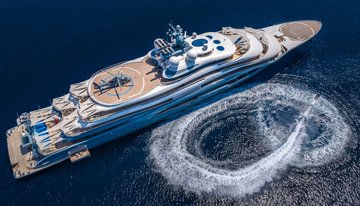
136m | Lurssen
from $4,258,000 p/week ♦︎

115m | Lurssen
from $2,768,000 p/week ♦︎
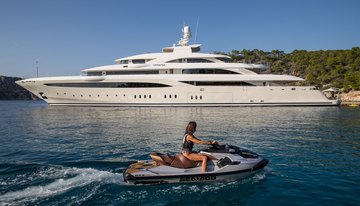
85m | Golden Yachts
from $958,000 p/week ♦︎
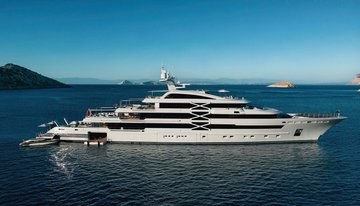
88m | Golden Yachts
from $1,171,000 p/week ♦︎
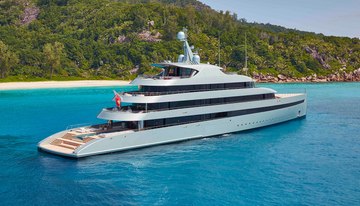
84m | Feadship
from $1,064,000 p/week ♦︎
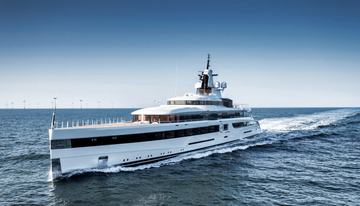
93m | Feadship
from $1,490,000 p/week ♦︎
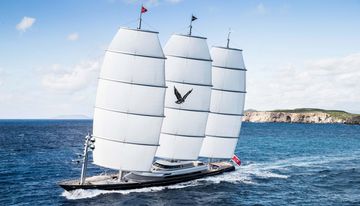
Maltese Falcon
88m | Perini Navi
from $490,000 p/week

122m | Lurssen
from $3,000,000 p/week
As Featured In
The YachtCharterFleet Difference
YachtCharterFleet makes it easy to find the yacht charter vacation that is right for you. We combine thousands of yacht listings with local destination information, sample itineraries and experiences to deliver the world's most comprehensive yacht charter website.
San Francisco
- Like us on Facebook
- Follow us on Twitter
- Follow us on Instagram
- Find us on LinkedIn
- Add My Yacht
- Affiliates & Partners
Popular Destinations & Events
- St Tropez Yacht Charter
- Monaco Yacht Charter
- St Barts Yacht Charter
- Greece Yacht Charter
- Mykonos Yacht Charter
- Caribbean Yacht Charter
Featured Charter Yachts
- Maltese Falcon Yacht Charter
- Wheels Yacht Charter
- Victorious Yacht Charter
- Andrea Yacht Charter
- Titania Yacht Charter
- Ahpo Yacht Charter
Receive our latest offers, trends and stories direct to your inbox.
Please enter a valid e-mail.
Thanks for subscribing.
Search for Yachts, Destinations, Events, News... everything related to Luxury Yachts for Charter.
Yachts in your shortlist
How To Become A Yacht Broker

Jul 19, 2016
Professional yacht brokering is an appealing career for many people who have a maritime background and live close to the water. How does one go about becoming a yacht broker? What steps should you take in order to successfully become a licensed broker? Let’s look at some fundamental requirements one must consider in the pursuit of becoming a broker.
It’s important to understand the industry of boating before diving into this career path. Being familiar with different boat brands is key; you wouldn’t start selling cars with any knowledge of car brands. This will serve as a base for understanding the prices, quality, performance, and manufacturing quality of individual yachts. Having this basic comprehension will pave the way for smooth sailing when dealing with experienced and amateur customers.
Certifications:
The Yacht Brokers Association of America strongly recommends that new brokers receive their CPYB (Certified Professional Yacht Broker). This certification is not mandatory for yacht brokering, but it puts potential customers in a more comfortable situation. To become eligible for certification, one must have at least three years in sales/yacht brokerage, a history of using and maintaining legal contracts, required licenses, and proof of appropriate trust accounts. The certification process concludes with an exam that determines if one is fit to become a certified broker.
Only a few states actually require new yacht brokers to have a license. States that do require one will need to see evidence of a background in sales, more specifically experience under another licensed broker. Another portion of states will require an administered background check in order to continue the licensing process. Next, yacht brokers may have to take out surety bonds in order to protect their clients and themselves in case of a financial emergency. After acquiring your license, it’s important to note that state rules and regulations state that you must renew your license pending a specific amount of time.
A bachelor’s degree is the standard to find employment in yacht brokering, although having a GED or no formal higher-level education could be sufficient depending on the situation. Ultimately, having a strong knowledge of boats and boating culture can take you far in this field, it is more than possible to become successful in yacht brokering without a college degree.
In the end, anyone can become a yacht broker. If you are motivated, like to make your own hours, and have a thorough knowledge of everything boating…you are on the right track. If you have any questions, or have any of your own tips for becoming a yacht broker, please leave a comment!
Interested in becoming a yacht broker? Join our team today! Contact us at [email protected] or call our office at 910-239-9344. Learn more here!
Have a Boat to Sell?
- Select a Year
- Select a Make
- AB Inflatables
- Action Craft
- Albury Brothers
- American Custom Yachts
- American Tug
- Argos Nautic
- Arrow head ski
- Austin Parker
- Barker Boatworks
- Bass seeker
- Bass Tracker
- Boca Grande
- Boston Whaler
- Buddy Davis
- Californian
- Cap-N-Squid
- Carolina Cat
- Carolina Classic
- Carolina Skiff
- Carolina Skimmer
- Center Console
- Chaparral Vortex
- Chris-Craft
- Cinco Boatworks
- Competition
- Correct craft
- Costa Custom Boats
- Cruisers Yachts
- Custom Carolina
- Custom Line
- Cypress cay
- De Antonio Yachts
- Deep Impact
- El ShaddieFla
- Fathom Yachts
- Ferretti Yachts
- Forest River
- Fountaine Pajot
- Freedom Boat Works
- Front Runner
- Gamefisherman
- Glacier Bay
- Grady-White
- Grand Banks
- Hacker-Craft
- Harris FloteBote
- Hunt Yachts
- Hydra sports
- Hydra-Sports
- Inmar Inflatable
- Intermarine
- Island Runner
- J&H Performance
- Jarrett Bay
- Jersey Cape
- Jet Williams
- Jones Brothers
- Judge Yachts
- Kadey-Krogen
- LaserPerformance
- Lazzara Yachts
- Lexington Pontoon
- Liquid Glass
- Little Harbor
- Macgregor/Venture
- Magnum Marine
- Maimi sport
- Malcolm Tennant
- Marine trader trawler
- Mastercraft
- Mathews Brothers
- Maverick Boat Co.
- Mckee Craft
- Midnight Express
- Miller Marine
- Misty Harbor
- Monte Carlo
- Monte Carlo Yachts
- Nautic Star
- Nordic Tugs
- North Coast
- OBX Boatworks
- Ocean Alexander
- Ocean Master
- Ocean Runner
- Ocean Yachts
- Outer Banks
- Outer Limits
- Pacific Mariner
- Pair Customs
- Palmer Johnson
- Polar kraft
- Pontoon Air Cruiser
- Ranger Tugs
- Reef Runner
- Release Boatworks
- Rockharbour
- Rodriguez Yachts
- Schaefer Yachts
- Seaswirl Striper
- Sessa Marine
- Shallow Sport
- Siar Moschini
- Silver wave pontoon
- Smoker Craft
- Smokercraft
- Steiger Craft
- Sun Tracker
- Tahoe tritton
- Tecnomar Yachts
- Tiara Sport
- Tiara Yachts
- Tracker Grizzly
- Tracker Marine
- Tracker pro160
- Tracker Tahoe
- Tracker Tahoe Q4 Ski
- True World Marine
- United marine
- Vintage Hickman
- Water Mocassin
- Williams Jet Tenders
- Williamscraft
- Windsor Craft
- Winter Custom Yachts
- Wooden sailing Dinghy
- Yamaha Boats
- yamaha linux
- ZAR Formenti
- Length (ft)
- 100 ft
- 101 ft
- 102 ft
- 103 ft
- 104 ft
- 105 ft
- 106 ft
- 107 ft
- 108 ft
- 109 ft
- 110 ft
- 111 ft
- 112 ft
- 113 ft
- 114 ft
- 115 ft
- 116 ft
- 117 ft
- 118 ft
- 119 ft
- 120 ft
- 121 ft
- 122 ft
- 123 ft
- 124 ft
- 125 ft
- 126 ft
- 127 ft
- 128 ft
- 129 ft
- 130 ft
- 131 ft
- 132 ft
- 133 ft
- 134 ft
- 135 ft
- 136 ft
- 137 ft
- 138 ft
- 139 ft
- 140 ft
- 141 ft
- 142 ft
- 143 ft
- 144 ft
- 145 ft
- 146 ft
- 147 ft
- 148 ft
- 149 ft
- 150 ft
- 151 ft
- 152 ft
- 153 ft
- 154 ft
- 155 ft
- 156 ft
- 157 ft
- 158 ft
- 159 ft
- 160 ft
- 161 ft
- 162 ft
- 163 ft
- 164 ft
- 165 ft
- 166 ft
- 167 ft
- 168 ft
- 169 ft
- 170 ft
- 171 ft
- 172 ft
- 173 ft
- 174 ft
- 175 ft
- 176 ft
- 177 ft
- 178 ft
- 179 ft
- 180 ft
- 181 ft
- 182 ft
- 183 ft
- 184 ft
- 185 ft
- 186 ft
- 187 ft
- 188 ft
- 189 ft
- 190 ft
- 191 ft
- 192 ft
- 193 ft
- 194 ft
- 195 ft
- 196 ft
- 197 ft
- 198 ft
- 199 ft
- 200 ft
- Bahasa Indonesia
- Slovenščina
- Science & Tech
- Russian Kitchen
Cruising the Moskva River: A short guide to boat trips in Russia’s capital

There’s hardly a better way to absorb Moscow’s atmosphere than on a ship sailing up and down the Moskva River. While complicated ticketing, loud music and chilling winds might dampen the anticipated fun, this checklist will help you to enjoy the scenic views and not fall into common tourist traps.
How to find the right boat?
There are plenty of boats and selecting the right one might be challenging. The size of the boat should be your main criteria.
Plenty of small boats cruise the Moskva River, and the most vivid one is this yellow Lay’s-branded boat. Everyone who has ever visited Moscow probably has seen it.
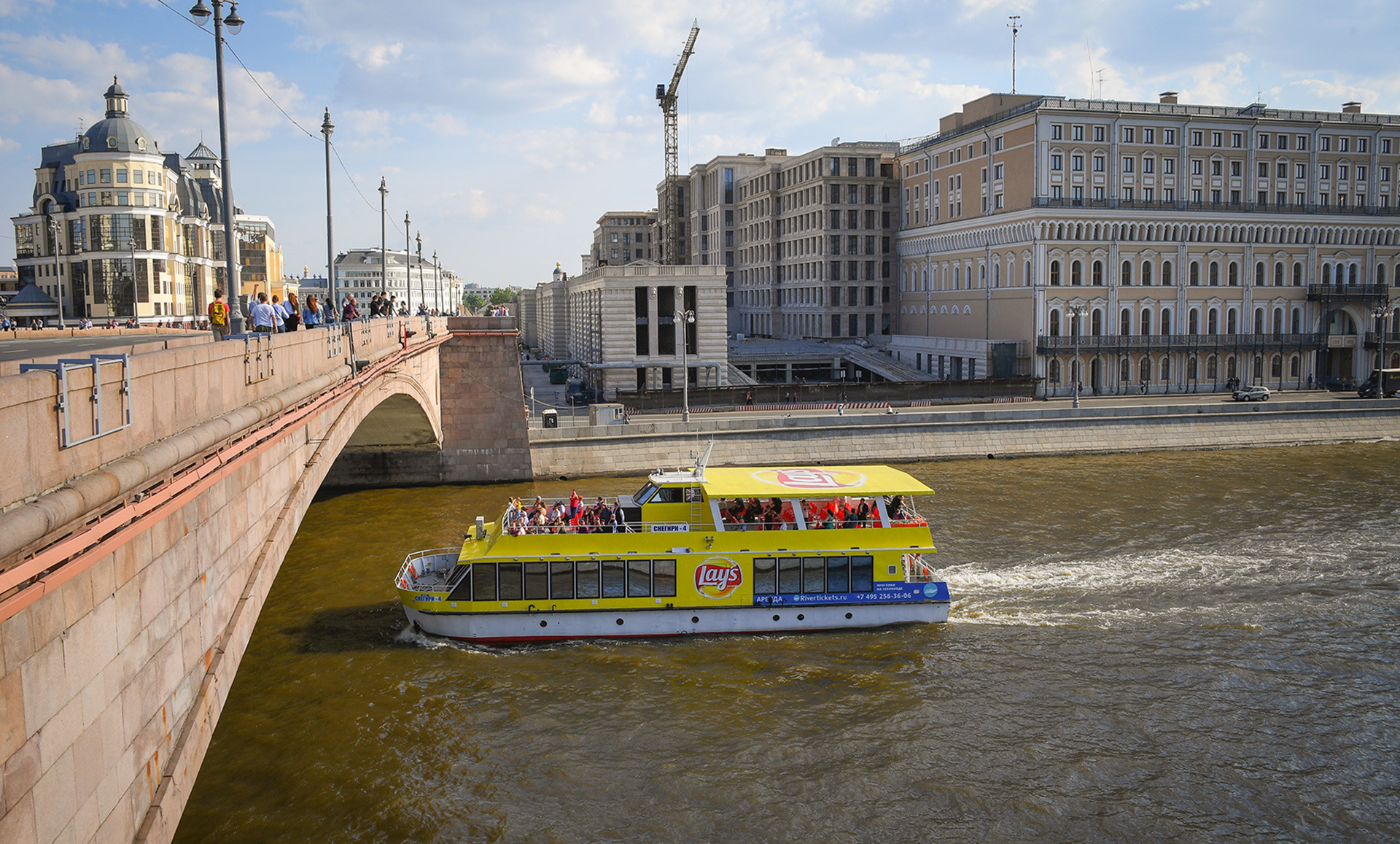
This option might leave a passenger disembarking partially deaf as the merciless Russian pop music blasts onboard. A free spirit, however, will find partying on such a vessel to be an unforgettable and authentic experience that’s almost a metaphor for life in modern Russia: too loud, and sometimes too welcoming. Tickets start at $13 (800 rubles) per person.
Bigger boats offer smoother sailing and tend to attract foreign visitors because of their distinct Soviet aura. Indeed, many of the older vessels must have seen better days. They are still afloat, however, and getting aboard is a unique ‘cultural’ experience. Sometimes the crew might offer lunch or dinner to passengers, but this option must be purchased with the ticket. Here is one such option offering dinner for $24 (1,490 rubles).
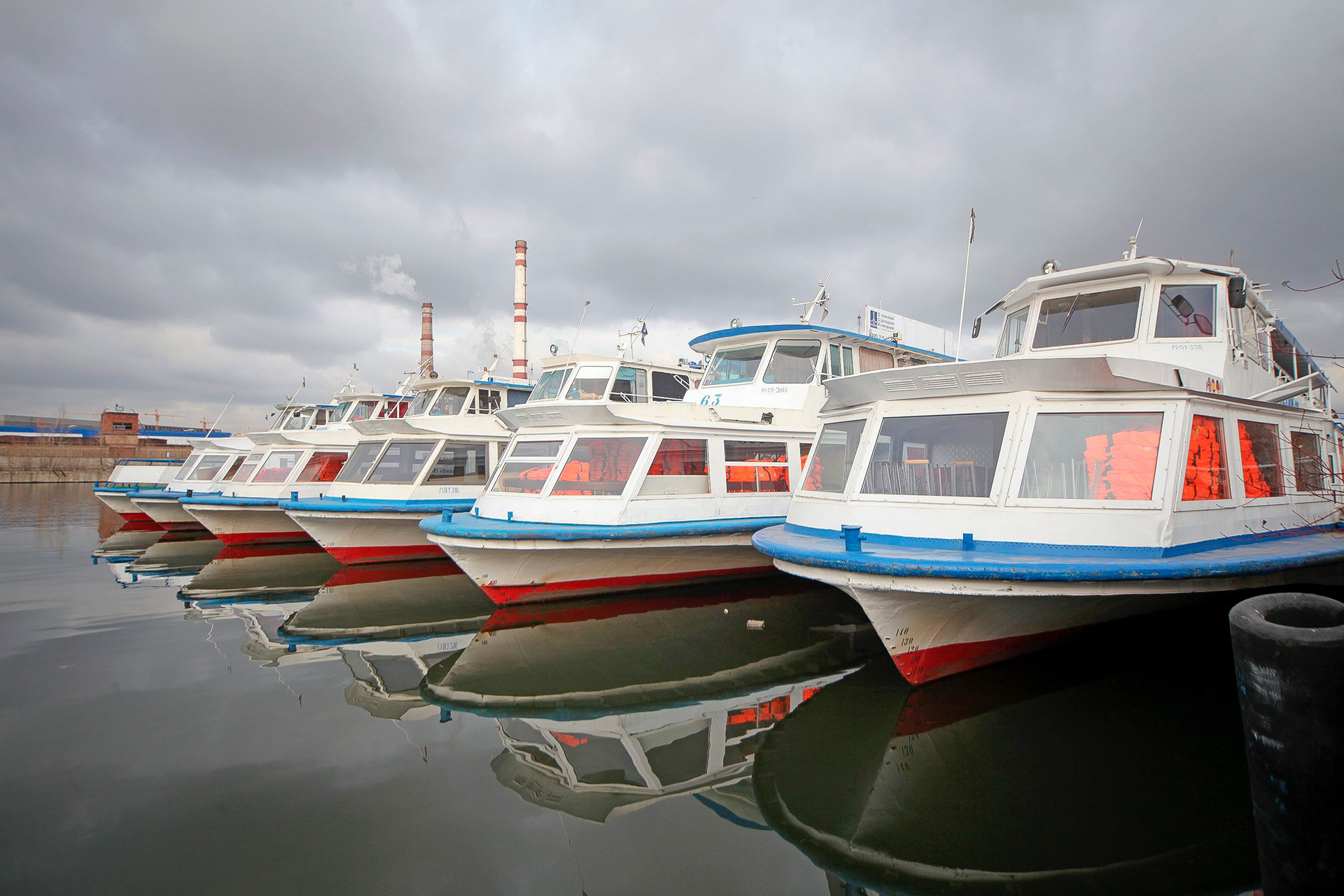
If you want to travel in style, consider Flotilla Radisson. These large, modern vessels are quite posh, with a cozy restaurant and an attentive crew at your service. Even though the selection of wines and food is modest, these vessels are still much better than other boats.
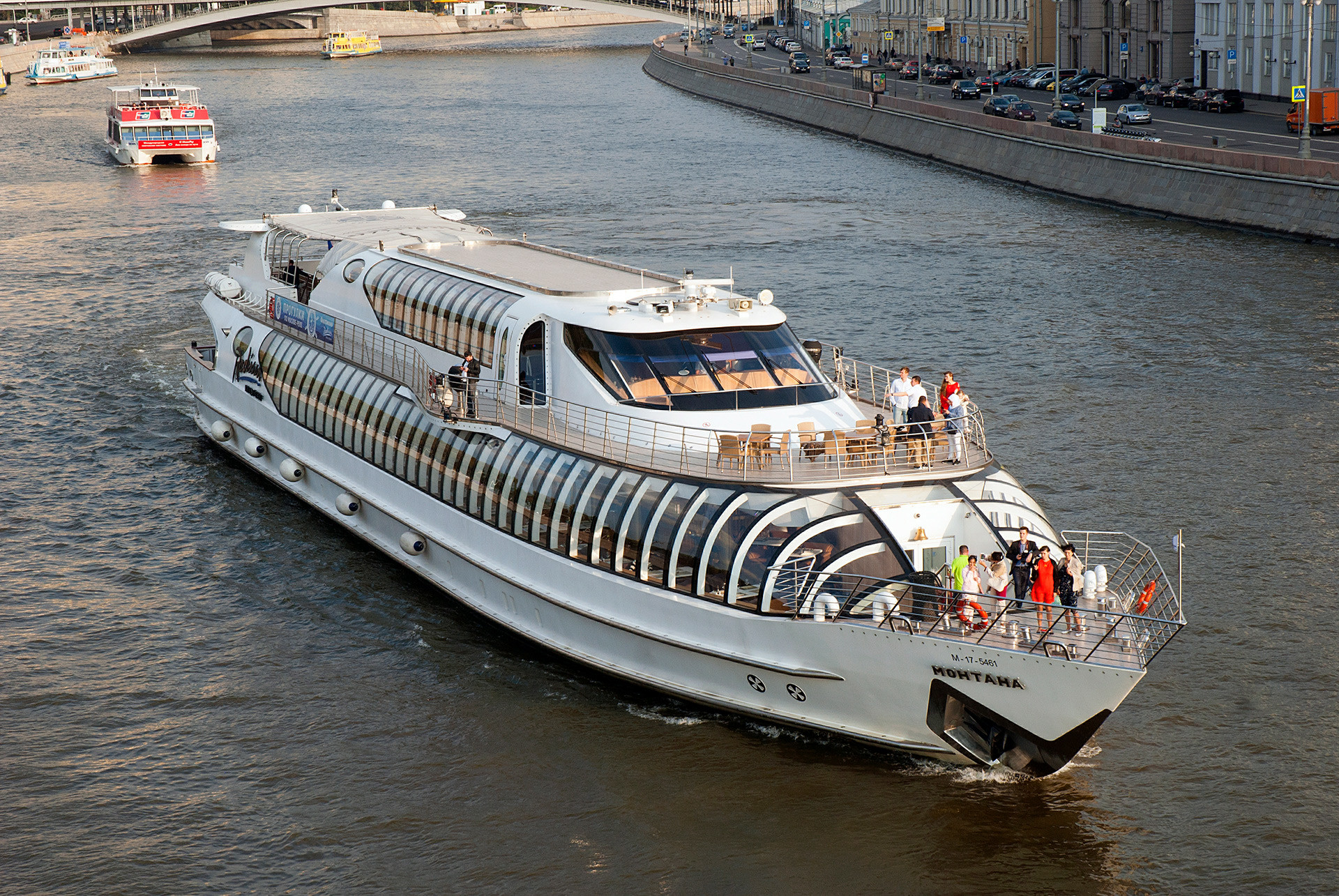
Surprisingly, the luxurious boats are priced rather modestly, and a single ticket goes for $17-$32 (1,100-2,000 rubles); also expect a reasonable restaurant bill on top.
How to buy tickets?
Women holding photos of ships promise huge discounts to “the young and beautiful,” and give personal invitations for river tours. They sound and look nice, but there’s a small catch: their ticket prices are usually more than those purchased online.
“We bought tickets from street hawkers for 900 rubles each, only to later discover that the other passengers bought their tickets twice as cheap!” wrote (in Russian) a disappointed Rostislav on a travel company website.
Nevertheless, buying from street hawkers has one considerable advantage: they personally escort you to the vessel so that you don’t waste time looking for the boat on your own.

Prices start at $13 (800 rubles) for one ride, and for an additional $6.5 (400 rubles) you can purchase an unlimited number of tours on the same boat on any given day.
Flotilla Radisson has official ticket offices at Gorky Park and Hotel Ukraine, but they’re often sold out.
Buying online is an option that might save some cash. Websites such as this offer considerable discounts for tickets sold online. On a busy Friday night an online purchase might be the only chance to get a ticket on a Flotilla Radisson boat.
This website (in Russian) offers multiple options for short river cruises in and around the city center, including offbeat options such as ‘disco cruises’ and ‘children cruises.’ This other website sells tickets online, but doesn’t have an English version. The interface is intuitive, however.
Buying tickets online has its bad points, however. The most common is confusing which pier you should go to and missing your river tour.

“I once bought tickets online to save with the discount that the website offered,” said Igor Shvarkin from Moscow. “The pier was initially marked as ‘Park Kultury,’ but when I arrived it wasn’t easy to find my boat because there were too many there. My guests had to walk a considerable distance before I finally found the vessel that accepted my tickets purchased online,” said the man.
There are two main boarding piers in the city center: Hotel Ukraine and Park Kultury . Always take note of your particular berth when buying tickets online.
Where to sit onboard?
Even on a warm day, the headwind might be chilly for passengers on deck. Make sure you have warm clothes, or that the crew has blankets ready upon request.
The glass-encased hold makes the tour much more comfortable, but not at the expense of having an enjoyable experience.

Getting off the boat requires preparation as well. Ideally, you should be able to disembark on any pier along the way. In reality, passengers never know where the boat’s captain will make the next stop. Street hawkers often tell passengers in advance where they’ll be able to disembark. If you buy tickets online then you’ll have to research it yourself.
There’s a chance that the captain won’t make any stops at all and will take you back to where the tour began, which is the case with Flotilla Radisson. The safest option is to automatically expect that you’ll return to the pier where you started.
If using any of Russia Beyond's content, partly or in full, always provide an active hyperlink to the original material.
to our newsletter!
Get the week's best stories straight to your inbox
- What to do in Moscow City, if you’re not mega-rich
- Moscow after dusk: 10 places to drink, dance, and groove
- 5 things you must do in Moscow in 2018 between football matches (or without them)
- Sandwiched between Moscow and St. Petersburg: How to spend a perfect weekend in Tver
- 24 or 48 hours in Moscow: Where to go and what to do in 2019
This website uses cookies. Click here to find out more.

Navigating Paradise: The Ultimate Guide to Greece Yacht Charters for Sophisticated Travelers
Reasons for greece yacht charters among discerning travelers.
W ith its charming scenery, azure waters, and many islands, Greece offers a yachting experience that can only be rivaled by none. A holiday in Greece on a chartered yacht is more than just another trip – it allows you to enter the world of sea luxury, tremendous history, and astonishing natural wonders. Danielis Yachting is an experienced provider of luxury yachts in Greece and one of the top organizers in this exclusive niche. Each charter is not a tour but a customized path through Eden because Danielis Yachting has an up-to-scratch fleet of yachts and a crew that knows what top hospitality means.
Choose Your Ideal Yacht
Choosing the right yacht is your primary decision in your Greek sea journey. Whether you prefer a swift motor yacht, grand sailing boat, or luxurious catamaran, the experience you will enjoy will be distinct. Motor yachts provide the fullness of incredible velocity and motionlessness accordingly, while catamarans allow maximum space for your comfort. As for the grand traditional sailing boats, it is about the experience. Such unique options as danielisyachting.com propose an extensive list of yachts for all four to choose their best. The following passages will consider every type of yacht. Besides, it will provide tips on how to decide the most suitable one. Comfort, efficiency, and elegance will be highlighted.
Planning Your Itinerary
A yacht charter in Greece offers the freedom to explore secluded bays, vibrant ports, and ancient ruins at your own pace. Planning your itinerary with Danielis Yachting allows you to customize your journey to include iconic islands such as Santorini and Mykonos and hidden gems like the tranquil Ionian islands or the mystical Sporades. This section will guide you through crafting the perfect itinerary that balances adventure with relaxation and cultural exploration with leisure. We'll provide insights into the must-visit destinations, optimal travel routes, and seasonal considerations to help you maximize your Greece yacht charter.
Capturing Local Culture and Flavors
Finally, Greek cuisine and culture should be at the core of the experience. While it would be impossible to encompass each island's history and local cuisines in the manuscript, highlighting the cultural treasures accessible to guests is highly recommended. Since the crew is recruited and guided by professionals from Danielis Yachting, there is always at least one native Greek per voyage. Hence, providing an overview of common aspects, such as getaways to local restaurants and festival participation, should create a sufficient foundation for this preliminary research on local attractions on each island.
What to Pack for Your Yacht Adventure
Packing for a yacht charter differs significantly from packing for a typical vacation. This section will provide sophisticated travelers with practical tips on what to bring for a yacht journey in Greece. From the essentials like swimwear and sun protection to bright casual outfits for evening outings, we'll cover everything you need to pack. Additionally, we'll include advice on gadgets and gear that can enhance your yachting experience, ensuring you're well-prepared for whatever adventures lie ahead.
Making the Most of Your Yacht Charter with Danielis Yachting
To truly make the most of your Greece yacht charter, partnering with a knowledgeable and experienced provider like Danielis Yachting can make all the difference. This section will highlight the exclusive services and amenities that Danielis Yachting offers, from personalized customer service to additional offerings like jet skis, diving equipment, and bespoke event planning aboard. We'll explore how these services enhance your journey, turning a simple holiday into an unforgettable experience and ensuring that every trip detail is meticulously catered to your satisfaction.


An official website of the United States government
Here’s how you know
The .gov means it’s official.
Federal government websites often end in .gov or .mil. Before sharing sensitive information, make sure you’re on a federal government site.
The site is secure.
The https:// ensures that you are connecting to the official website and that any information you provide is encrypted and transmitted securely.
Russia-related Designations and Designation Update; Central African Republic Designations; Transnational Criminal Organizations Designation; Global Magnitsky Designations; Issuance of Global Magnitsky General Licenses and Frequently Asked Questions
The Department of the Treasury's Office of Foreign Assets Control (OFAC) is issuing Global Magnitsky General License 5 , "Authorizing Certain Transactions Related to Frigorifico Chajha S.A.E." and General License 6 , "Authorizing the Wind Down of Transactions Involving Bebidas USA Inc., Tabacos USA Inc., Frigorifico Chajha S.A.E., Dominicana Acquisition S.A., or Certain Blocked Entities Owned by Horacio Manuel Cartes Jara." OFAC is also issuing two Frequently Asked Questions ( 1111 and 1112 ).
The following additions and changes have been made to OFAC's list of Specially Designated Nationals:
The following vessels have been added to OFAC's SDN List:
ADDICTION (9HA4571) Yacht Malta flag; Vessel Year of Build 2010; Vessel Registration Identification IMO 1010193; MMSI 248233000 (vessel) [RUSSIA-EO14024] (Linked To: ADONEV, Sergei Nikolaevich). ANATTA (ZGB15) Yacht Cayman Islands flag; Vessel Year of Build 2011; Vessel Registration Identification IMO 1011159; MMSI 319025900 (vessel) [RUSSIA-EO14024] (Linked To: ADONEV, Sergei Nikolaevich).
The following aircraft have been added to OFAC's SDN List:
RA-76502; Aircraft Manufacture Date 1990; Aircraft Model IL-76TD; Aircraft Manufacturer's Serial Number (MSN) 1003401004; Aircraft Tail Number RA-76502 (aircraft) [RUSSIA-EO14024] (Linked To: JSC AVIACON ZITOTRANS). RA-76842; Aircraft Manufacture Date 1993; Aircraft Model IL-76TD; Aircraft Manufacturer's Serial Number (MSN) 1033418616; Aircraft Tail Number RA-76842 (aircraft) [RUSSIA-EO14024] (Linked To: JSC AVIACON ZITOTRANS). RA-76846; Aircraft Manufacture Date 28 Dec 1989; Aircraft Model IL-76TD; Aircraft Manufacturer's Serial Number (MSN) 93497936; Aircraft Tail Number RA-76846 (aircraft) [RUSSIA-EO14024] (Linked To: JSC AVIACON ZITOTRANS). RA-78765; Aircraft Manufacture Date 30 Jun 1988; Aircraft Model IL-76TD; Aircraft Manufacturer's Serial Number (MSN) 83486590; Aircraft Tail Number RA-78765 (aircraft) [RUSSIA-EO14024] (Linked To: JSC AVIACON ZITOTRANS). S5-SAD; Aircraft Manufacture Date 2013; Aircraft Model Bombardier Global 6000; Aircraft Manufacturer's Serial Number (MSN) 9553 (aircraft) [RUSSIA-EO14024] (Linked To: ADONEV, Sergei Nikolaevich).

COMMENTS
The tabs below will help you in applying to become a Charter Boat Captain. The type of credential you receive is based upon your experience which includes the following: Total days of service. Waters served upon. Tonnage of the vessels. The checklists under each tab include the requirements to obtain that credential. OUPV (6-pack)
Note that a state boating card is different from a Coast Guard Captain's license. A boat safety course qualifies you to operate your personal boat, and have your friends and family on board. A USCG license is needed when you're operating a vessel in a commercial manner. When people are paying you, you need a license to operate.
A charter boat captain's license is issued by the United States Coast Guard and is based upon the following criteria: Total days of service. Waters served upon. Weight of the vessel. There are four main categories of charter boat captain license: Operator of Uninspected Passenger Vehicles License (OUPV) - One of the most popular types of ...
The OUPV license is a U.S. Coast Guard boat captain's license that allows the holder to take up to six paying passengers and crew out on the water. It is issued in three forms: Inland License, Great Lakes & Inland License, and Near Coastal. Many aspiring charter boat captains go after the OUPV license unless they plan to operate charter boats ...
What the FWC saltwater charter license DOES NOT authorize: Harvest in commercial quantities or the sale of fish. Passengers (whether licensed, not licensed, or exempt from licensure) in excess of the number specified on the FWC vessel license to take, attempt to take, or possess a limit of saltwater fish or organisms (even if licensed by the USCG to carry more paying passengers).
1 WHAT IS A SIX-PACK CAPTAIN'S LICENSE? The Six-pack captain's license, also known as the OUPV license, is a designation awarded by the United States Coast Guard that allows the holder to take up to six paying passengers and crew out on the water.The OUPV/Six-pack license is issued in three forms: Inland, Great Lakes & Inland, and Near Coastal. The Inland Captain's License allows the ...
5 mins read・Mar 06, 2023. The first step you need to take to get your captain's license is to decide which type of license you're going to pursue. There are two main types of Coast Guard licenses: License Type #1 - 25 ton, 50 ton, or 100 ton Master License. License Type #2 - Operator of Uninspected Passenger Vessels (OUPV or Six Pack)
It's major for a yacht charter license to stay well-informed about the newest developments and rules. The maritime industry is transforming quickly, so keeping up-to-date is essential for meeting legal requirements and pleasing customers. Keep track of the ever-changing industry through official sources. Subscribe to newsletters, join ...
This license is properly termed "Operator of Uninspected Passenger Vessels" ( OUPV) and is commonly referred to as the "6-pack" or "Charterboat Captain's License". The word "uninspected" means that the equipment required and the design of the boat are less regulated. "6-pack" refers to the 6 passenger limitation placed on ...
Although part of Europe, the U.K. differs to the mainland continent when it comes to yacht charter qualifications. In fact, no formal licensing is needed to sail the U.K.'s offshore waters. However, if you're planning any inland waterway discoveries (e.g. The Broads), you'll need a Boat Safety Scheme Certificate (BSSC) and boat insurance.
The International Sailing License and Credentials (SLC) is a recreational sailing license valid for all yacht charter companies worldwide including Europe and the Seychelles. To gain an SLC, the candidate must take online theroy knowledge self-paced classes, log previous sufficient sailing experience on boats of reasonably similar size, and ...
Upload your Boat US state boater license card to NauticEd. Gain the NauticEd Bareboat Charter Master Rank. Complete the NauticEd SLC exam. Pass the on-the-water assessment for bareboat charter by a NauticEd SLC qualified assessor. NauticEd will then issue you with a digital SLC card with a unique number.
If you are updating or changing the status of an existing license or licenses, you will most likely be required to submit an application. ... Yacht and Ships: Please choose from the menu below: Yacht & Ship Employing Broker, Broker or Salesperson's initial License: Yacht & Ship Salesperson Reinstatement: Yacht & Ship Employing Broker Reinstatement:
A sailing certification is different than a sailing license. No yacht charter company or Port Authority accepts a sailing certification as a stand-alone document verifying the competence of the Charterer. This is because of too many rubber-stamp-certifying bodies issuing such certifications without a real assessment of competence. There are no ...
Note: Crew on a private non-charter megayacht are not eligible for a D-1 Visa if the yacht will be cruising in US waters for more than 29 days, so those crew often obtain a B1/B2 Visa. Per confirmation in 2019 from the local CBP Director, foreign yacht crew may utilize a B1/B2 visa for both: Private yachts, not for commercial or charter use
The yacht brokerage process typically begins when a boat seller lists the yacht with a broker. Generally, the seller will agree to pay a commission to the yacht broker when the vessel sells (usually 10 percent of the boat's purchase price). This commission will be paid to the selling broker at the closing.
Sailboat charter. discount yacht charters. crewed and bareboat sailing, charter boat ownership and charter yacht buyers. Cruising logs and seamanship for yacht charters ... How does one substantiate the requirement of actual cruising time as a qualification for the "6 Pak" license? I have been boating for at least the last 15 years and have ...
Greek Charter Licence: the basics. The news rules state that owners of EU flagged yachts, and non-EU flagged yachts over 35 meters, wishing to conduct commercial yacht charters in Greece must now hold a Greek Charter Licence. In order to procure a licence for the yacht, the owner must first jump through several hoops, including;
To become eligible for certification, one must have at least three years in sales/yacht brokerage, a history of using and maintaining legal contracts, required licenses, and proof of appropriate trust accounts. The certification process concludes with an exam that determines if one is fit to become a certified broker.
Top Destin, FL fishing charters in Spring 2024, from US $83 p/p. Best price guaranteed, verified reviews, and secure online booking. 4-12 hour fishing trips for family and friends. ... Aboard a Destin fishing charter, not only will your license be covered, but you'll also have the knowledge of a true professional captain. As well as taking ...
Even though the selection of wines and food is modest, these vessels are still much better than other boats. Sergey Kovalev/Global Look Press. Surprisingly, the luxurious boats are priced rather ...
A yacht charter in Greece offers the freedom to explore secluded bays, vibrant ports, and ancient ruins at your own pace. Planning your itinerary with Danielis Yachting allows you to customize ...
The Charter of the City of Moscow (Russian: Устав города Москвы) is the basic law of the federal city and capital of Russia, Moscow.In the hierarchy of normative acts of the city, the charter has supreme legal force: other city laws and other regulations should not contradict the charter, and in the case of such a conflict, the charter is the supreme.
The Department of the Treasury's Office of Foreign Assets Control (OFAC) is issuing Global Magnitsky General License 5, "Authorizing Certain Transactions Related to Frigorifico Chajha S.A.E." and General License 6, "Authorizing the Wind Down of Transactions Involving Bebidas USA Inc., Tabacos USA Inc., Frigorifico Chajha S.A.E., Dominicana Acquisition S.A., or Certain Blocked Entities Owned by ...